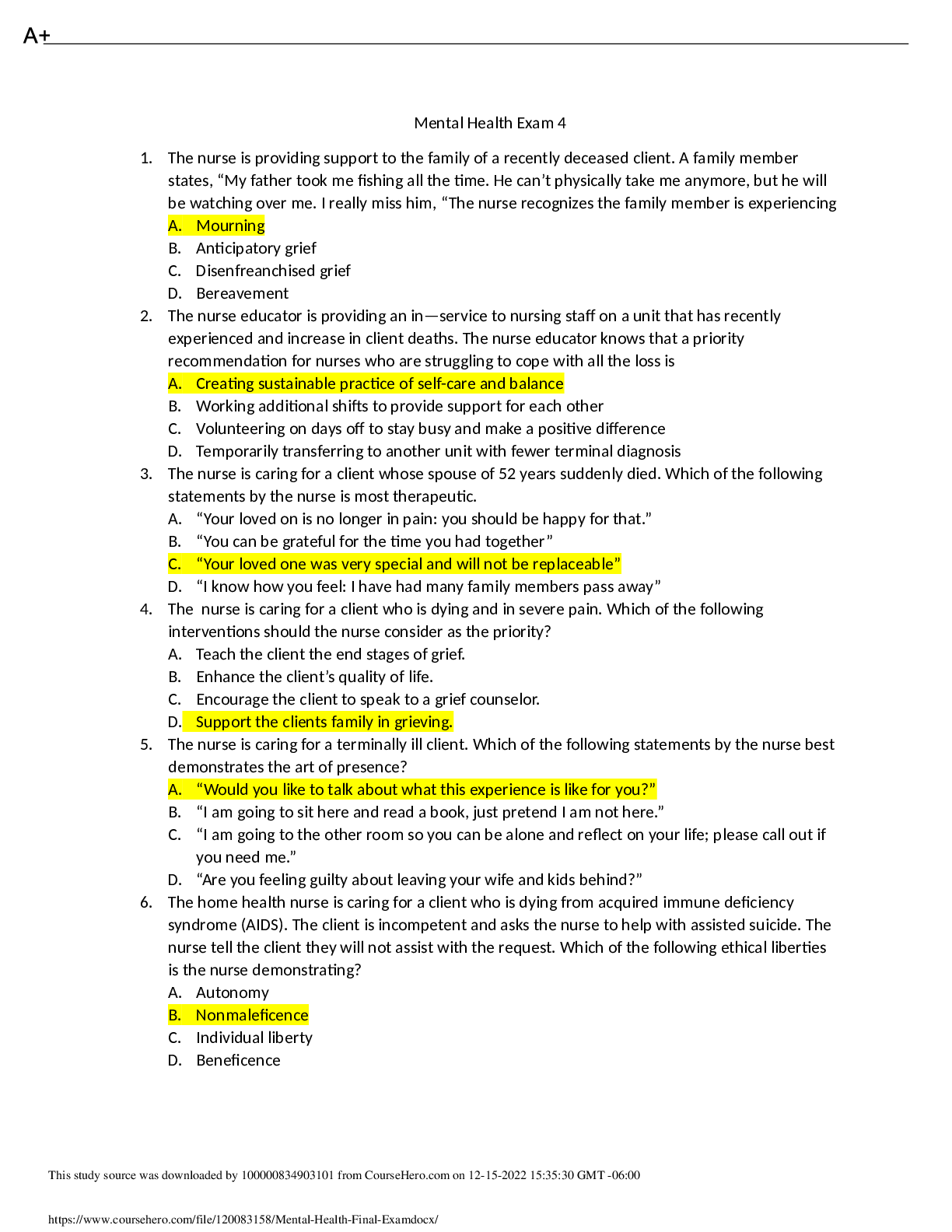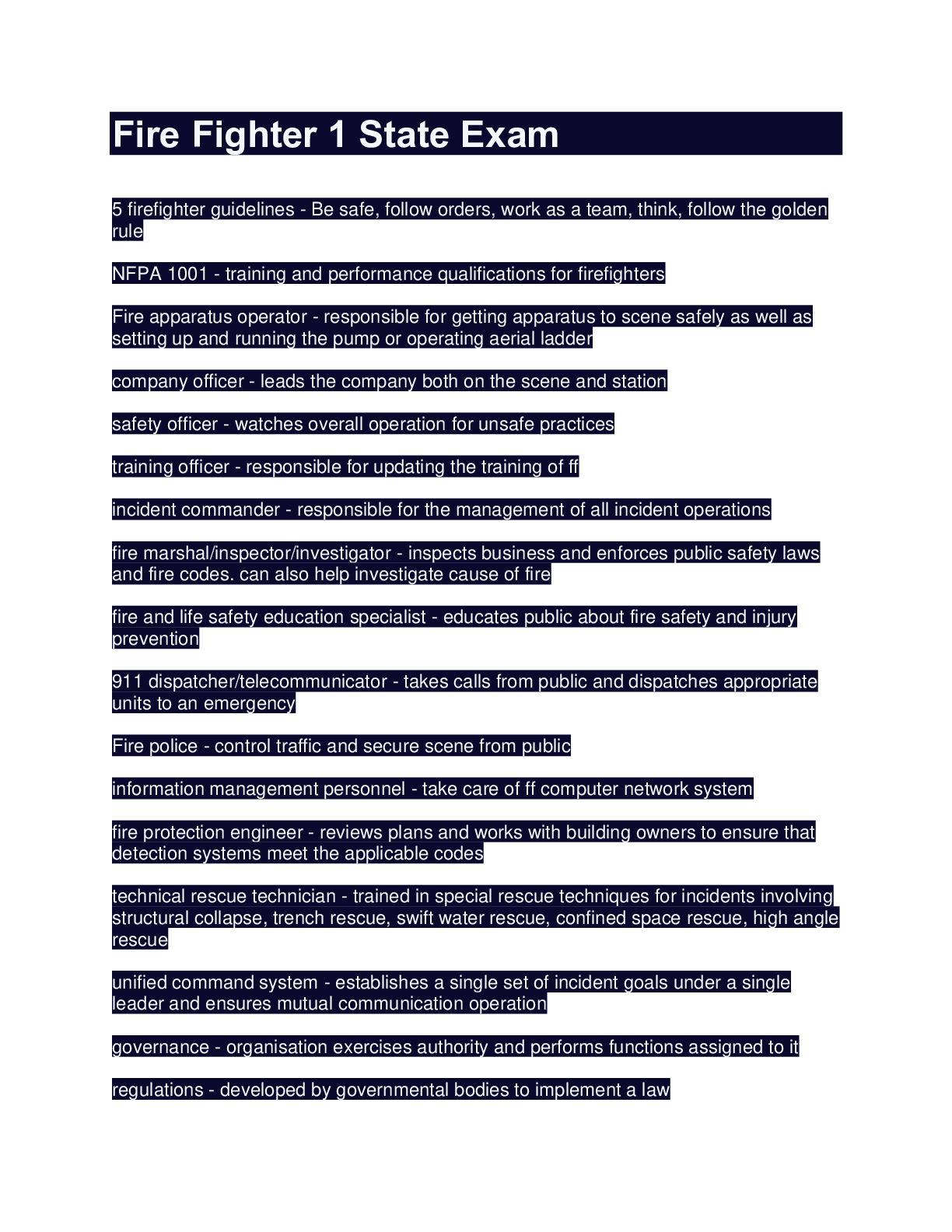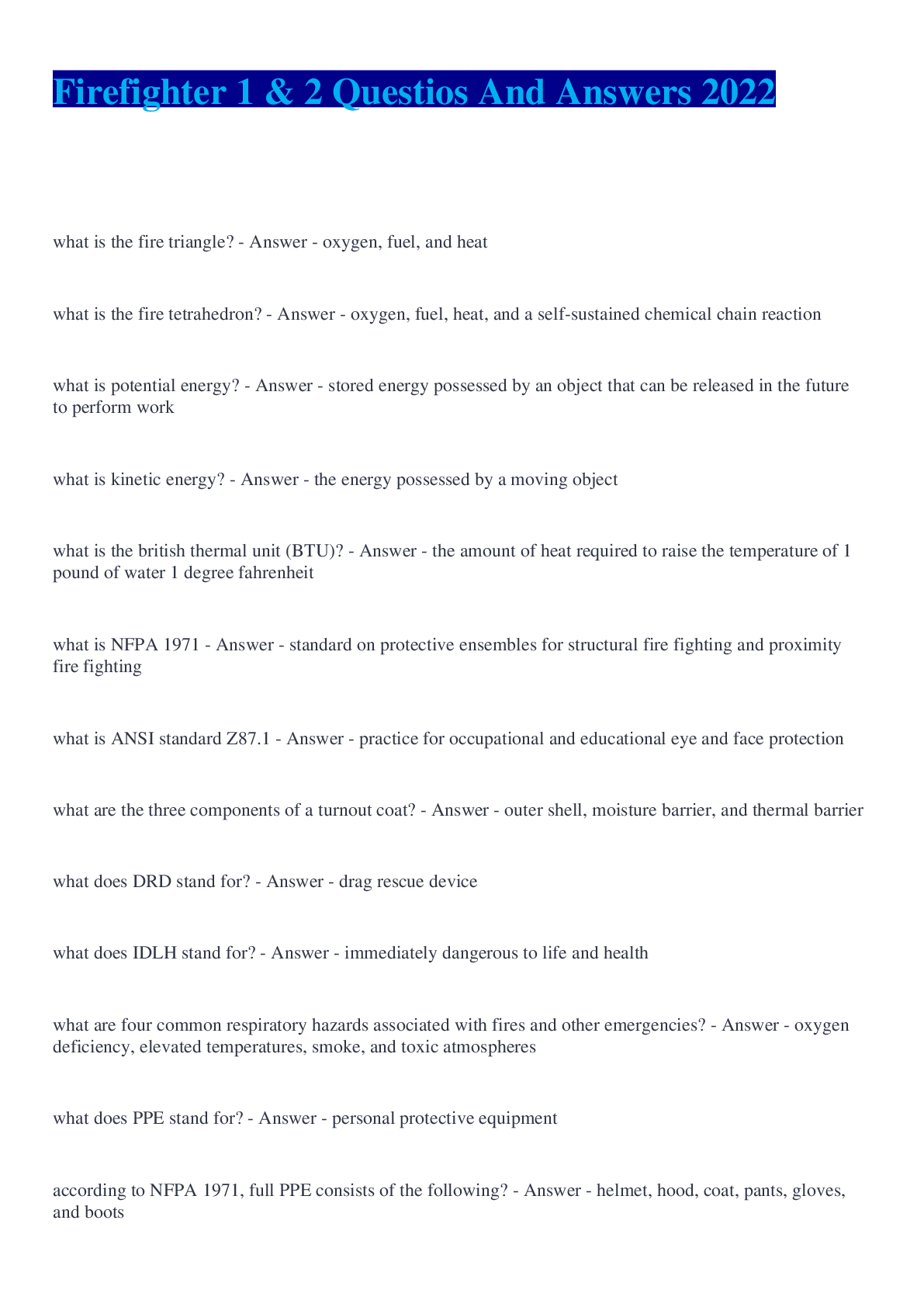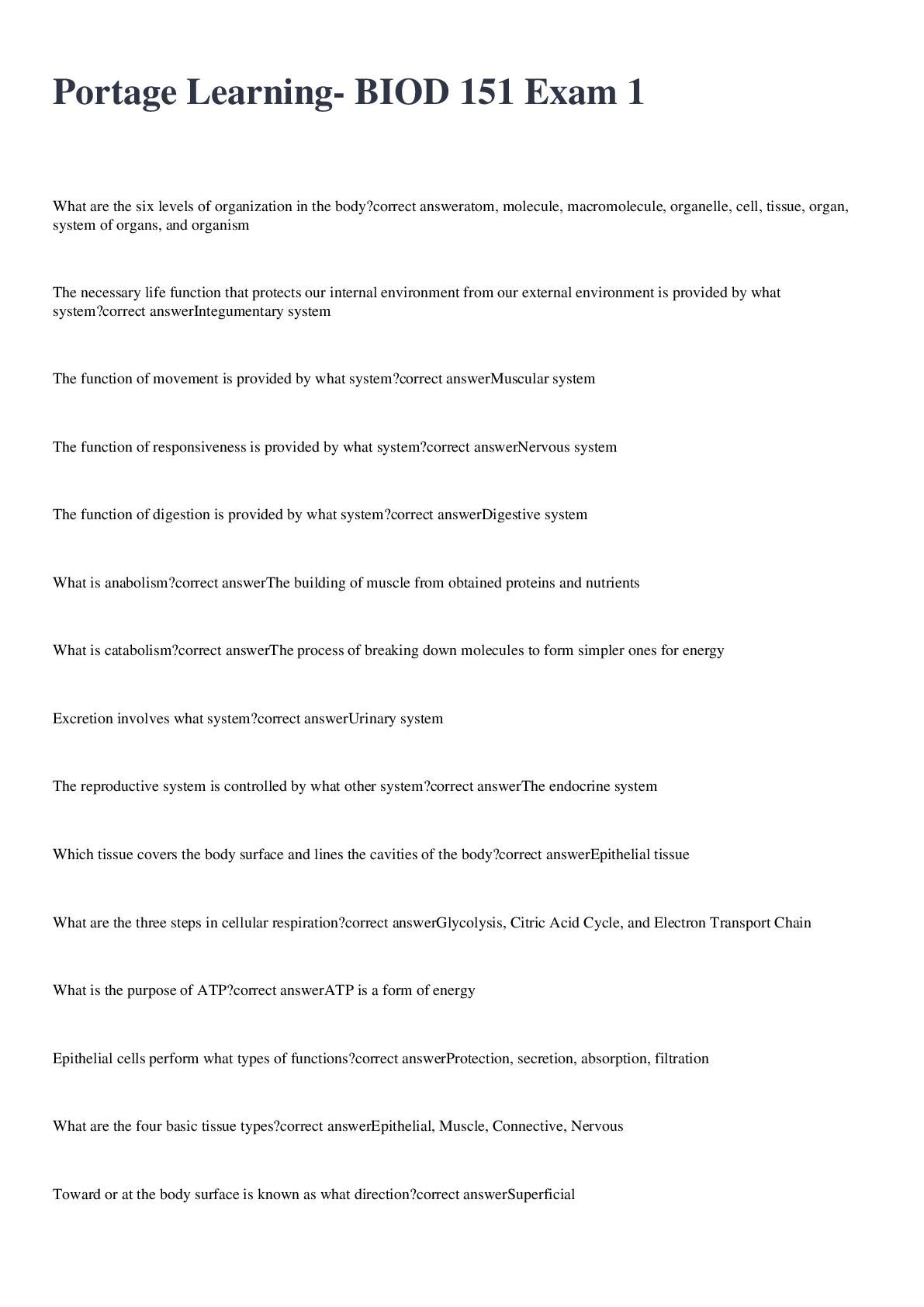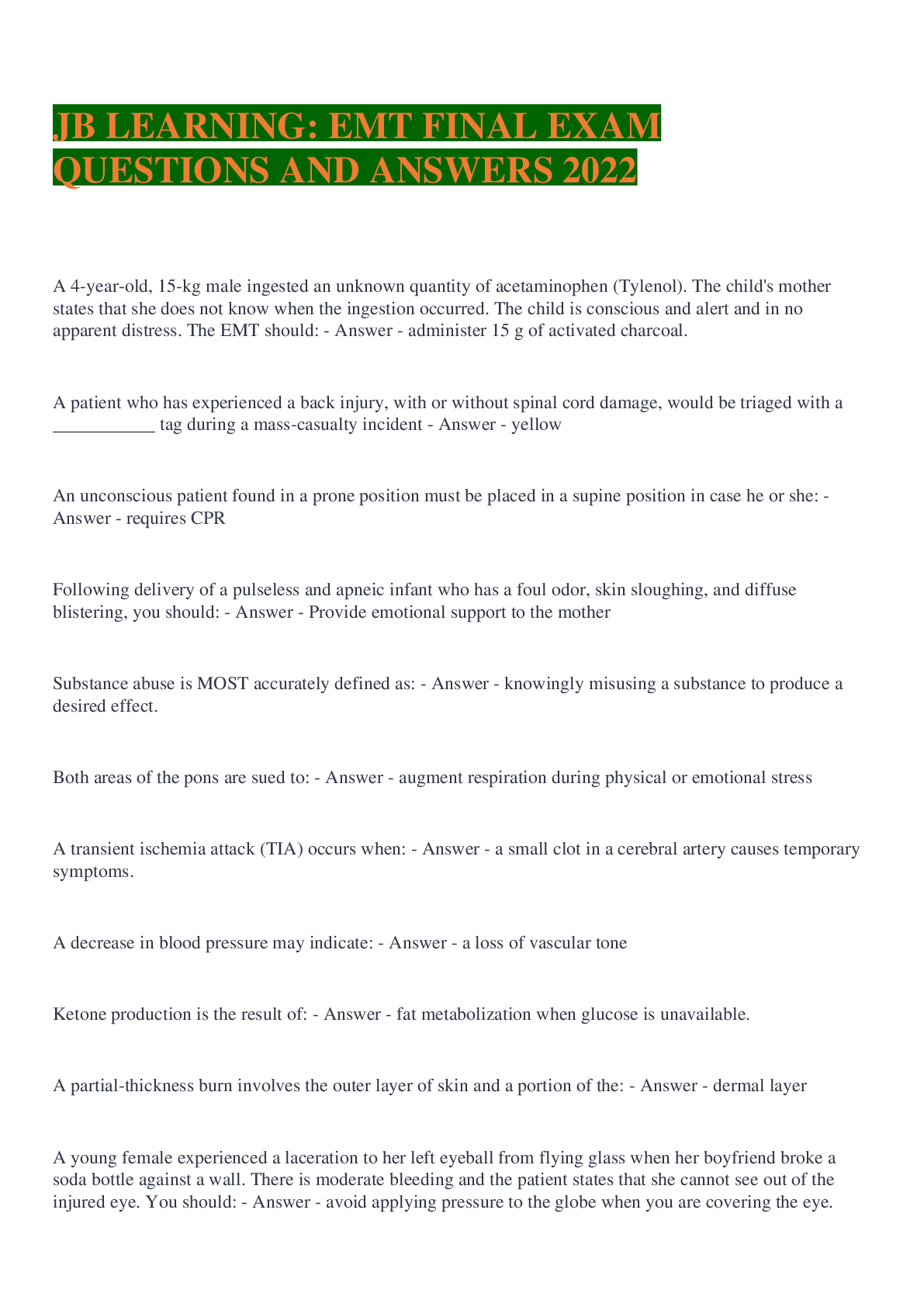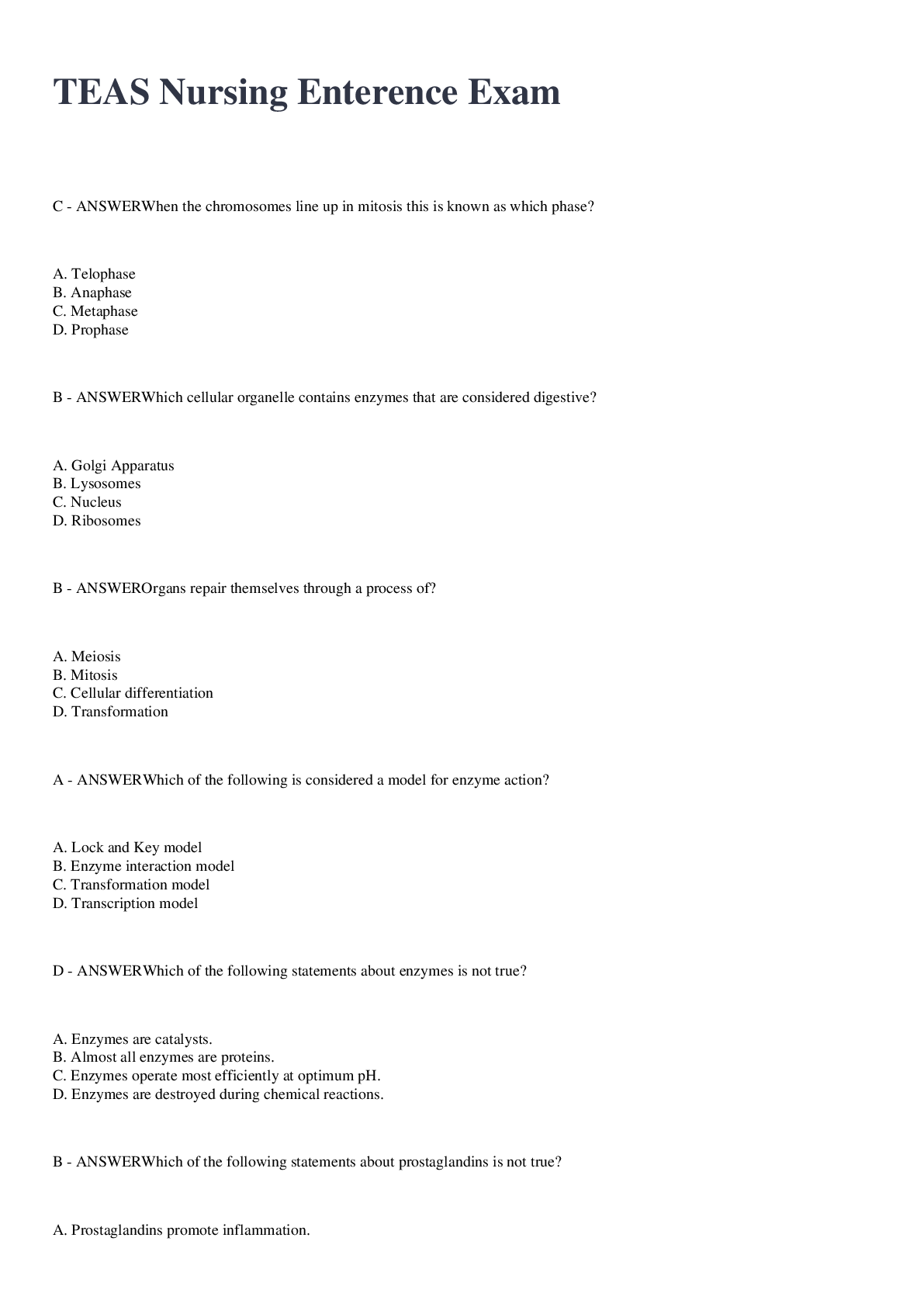NC Paralegal Certification Exam Questions and Answers 2022
Document Content and Description Below
acceptance - ANSWER in contract law, the offeree's indication to the offeror that the offeree agrees to be bound by the terms of the offeror's offer or proposal for a contract acquittal - ANSWER a ... certification of declaration following a trial that the individual accused of a crime is innocent, or free from guilt, in the eyes of the law and is thus absolved of the charges. actionable - ANSWER capable of serving as the basis of a lawsuit. an actionable claim can be pursued in a lawsuit or other court action active listening - ANSWER The act of listening attentively to the speaker's message and responding by giving appropriate feedback to show that you understand what the speaker is saying, restating the speaker's message in your own words to confirm that you accurately interpreted what was said. actual malice - ANSWER Real and demonstrable evil intent. In a defamation suit, a statement made about a public figure normally must be made with actual malice (with either knowledge of falsity or a reckless disregard for the truth) for liability to be incurred. actus reus - ANSWER A guilty (prohibited) act. The commission of a prohibited act is one of the two essential elements required for criminal liability. The other element is the intent to commit a crime. ad valorem - ANSWER Derived from the Latin ad valentiam, meaning "to the value", It is commonly applied to a tax imposed on the value of property. address block - ANSWER That part of a letter that indicates to whom the letter is addressed. The address block is placed in the upper left-hand portion of the letter, above the salutation (or reference line, if one is included). ademption clause - ANSWER The revocation, recalling, or cancellation of a legacy, according to the apparent intention of the testator, implied by the law from acts done by the testator during the testator's life. adjudication - ANSWER The act of resolving a controversy and rendering an order or decision based on review of the evidence presented. administrative agency - ANSWER A federal or state government agency established to perform a specific function. Administrative agencies are authorized by legislative acts to make and enforce rules relating to the purpose for which they were established. administrative process - ANSWER The procedure used by administrative agencies in the administration of law. administrative law - ANSWER A body of law created by administrative agencies in the form of rules, regulations, orders, and decisions in order to carry out their duties and responsibilities. administrative law judge (ALJ) - ANSWER One who presides over an administrative agency hearing and who has the power to administer oaths, take testimony, rule on questions of evidence, and make determinations otherwise authorized by law. administrator - ANSWER A person appointed by a court to serve as a personal representative for a person who died intestate (without a valid will) or if the executor named in the will cannot serve. adoption - ANSWER A procedure in which persons become the legal parents of a child who is not their biological child. adversarial system of justice - ANSWER A legal system in which the parties in a lawsuit are opponents, or adversaries, and present their cases in the light most favorable to themselves. The impartial decision maker (the judge or jury) determines who wins and who loses based on the evidence presented. adverse possession - ANSWER A process by which premises can change ownership. It is a common law concept concerning the title to real property. It is the occupation of land to which another person has title with the intention of possessing it as one's own. affidavit - ANSWER A written statement of facts confirmed by the oath or affirmation of the party making it and made before a person having the authority to administer the oath or affirmation. affirm - ANSWER To uphold the judgment of a lower court. affirmative defense - ANSWER A response to the plaintiff's claim that does not deny the plaintiff's facts but attacks the plaintiff's legal right to bring an action. agency - ANSWER A relationship between two persons in which one person (the agent) represents or acts in the place of another (the principal). agreement - ANSWER A meeting of the minds and a requirement for a valid contract. Agreement involves two distinct events: an offer to form a contract and the acceptance of that offer by the offeree. alimony - ANSWER Money paid to support a former spouse after a marriage has been terminated. The alimony may be permanent or temporary (rehabilitative). allegation - ANSWER A party's statement, claim, or assertion made in a pleading to the court. The allegation sets forth the issue that the party expects to prove. ALTA (American Land Title Association) - ANSWER A national trade association representing the interests of the abstract of title and title insurance industries. alternative dispute resolution (ADR) - ANSWER The resolution of disputes in ways other than those involved in the traditional judicial process. Negotiation, mediation, and arbitration are forms of ADR. Some courts require them before a case can go to trial. American Bar Association (ABA) - ANSWER A voluntary national association of attorneys, the ABA plays an active role in developing educational and ethical standards for attorneys and in pursuing improvements in the administration of justice. American Digest System - ANSWER A system of identifying points of law from reported cases and organizing them by topic and key number. The system was developed by West Publishing Company to organize the entire body of American Law. American Jurisprudence - ANSWER An encyclopedia of United States law published by West. American Law Reports - ANSWER A resource used by American lawyers to find a variety of sources relating to specific legal rules, doctrines, or principles. amicus curiae brief - ANSWER A brief filed with the court by a third party (i.e. one not directly involved in the lawsuit) who is concerned about the outcome of the litigation. The purpose of the brief is to convince the court to rule in favor of one of the parties because not to do so would affect a broad interest of society. (Friend of the court) annotation - ANSWER A brief comment, an explanation of legal point, or a case summary found in a case digest or other legal source. annulment - ANSWER A court decree that invalidates (nullifies) a marriage. Although the marriage itself is deemed nonexistent, children of a marriage that is annulled are legitimate. answer - ANSWER A defendant's response to a plaintiff's complaint. antenuptial agreement - ANSWER A written contract created by two people planning to be married. The agreement typically lists all of the property each person owns, as well as their debts, and it specifies what each person's property rights will be after they tie the knot. Antenuptial agreements often specify how property will be divided - and whether spousal support (alimony and post-separation support) will be paid - in the event of a divorce. appeal - ANSWER The process of seeking a higher court's review of the lower court's decision for the purpose of correcting or changing the lower court's judgment or decision. appellant - ANSWER The party who takes an appeal from one court to another; sometimes referred to as the petitioner. appellant's brief - ANSWER An appellate brief that argues in favor of the appellant's position. This brief will try to convince the court that the lower court's decision was erroneous on a point of LAW. (The facts aren't at issue anymore.) appellate court - ANSWER A court that reviews decisions made by lower courts, such as trial courts; a court of appeals. appellate jurisdiction - ANSWER The power of the court to hear and decide an appeal; i.e. the power and authority of a court to review cases that have already been tried in a lower court and the power to make decisions about them without holding a trial. This process is called appellate review. appellee - ANSWER The party against whom an appeal is taken; i.e. the party who opposes setting aside or reversing the judgment; the respondent. appellee's brief - ANSWER An appellate brief that argues in favor of the appellee's position. This brief will try to rebut (counter) any arguments in the appellant's brief and will emphasize the accuracy of the earlier judgment rendered in its favor. appropriation - ANSWER In tort law, the use by one person of another person's name, likeness, or other identifying characteristic without permission and or the benefit of the user. arbitration - ANSWER A method of settling disputes in which a dispute is submitted to a disinterested third party (other than a court), who renders a decision that may or may not be legally binding. arbitration clause - ANSWER A clause in a contract that provides that, in the case of a dispute, the parties will determine their rights by arbitration rather than through the judicial system. arraignment - ANSWER A court proceeding in which the suspect is formally charged with the criminal offense stated in the indictment. The suspect then enter a plea (guilty, not guilty, or nolo contendere) in response. arrest - ANSWER To take into custody a person suspected of criminal activity. arrest warrant - ANSWER A written order, based on probable cause and issued by a judge or public official (magistrate), commanding that the person named on the warrant be arrested by the police. arson - ANSWER The willful and malicious burning of a building (and, in some cases in NC: personal property); the destruction of any building regardless of ownership, by explosion or fire. articles of incorporation - ANSWER The document filed with the appropriate state official, usually the Secretary of State, when a business is incorporated. State statutes usually prescribe what kind of information must be contained in these articles. articles of organization - ANSWER A document necessary for setting up an LLC in many US states. It is similar to articles of incorporation used for setting up corporations. assault - ANSWER Any word or action intended to make another person fearful or apprehensive of immediate physical harm; a reasonably believable threat. associate attorney - ANSWER An attorney working for a law firm who is not a partner and does not have an ownership interest in the firm. less experienced, may be invited to be partners after years assumption of risk - ANSWER Voluntarily taking upon oneself a known risk. Assumption of risk is a defense against negligence that can be used when the plaintiff has knowledge of and appreciates a danger and voluntarily exposes himself to the danger. attestation clause - ANSWER A provision at the end of an instrument where the witnesses certify that the instrument has been executed before them, and the manner of the execution of the same. It states that the instrument has been completed in the manner required by law in the presence of the witnesses who placed their signatures in the designated spaces. attorney general - ANSWER The chief legal officer of the state who, either personally or through staff, represents the interests of the state in a variety of areas. attorney-client privilege - ANSWER A rule of evidence requiring that confidential communications between a client and the client's attorney (relating to their professional relationship) be kept confidential, unless the client consents to disclosure. authentication - ANSWER The process of establishing the genuineness of an item that is to be introduced as evidence in a trial. award - ANSWER In the context of ADR, the decision rendered by an arbitrator. bail - ANSWER The amount of money or conditions set by the court to assure that an individual accused of a crime will appear for further criminal proceedings. If the accused person provides bail, whether in cash or by means of a bail bond, then the person is released. bailiff - ANSWER Someone entrusted with the care and protection, guardianship, or jurisdiction of a person, land, or personal property pending further court action. It also refers to a court official of a law enforcement officer, usually a deputy sheriff, marshal, or constable, who keeps order in the courtroom and handles various tasks for the judge and clerk as calling cases to approach the bench. The bailiff acts as an intermediary between the judge and the attorneys. bankruptcy court - ANSWER A federal court of limited jurisdiction that hears only bankruptcy proceedings. bankruptcy law - ANSWER The body of federal law that governs bankruptcy proceedings. The goals of bankruptcy law are (1) to protect a debtor by giving the debtor a fresh start, free from creditors' claims; and (2) to ensure that creditors who are competing for a debtor's assets are treated fairly. battery - ANSWER The intentional and offensive touching of another without lawful justification. beneficiary - ANSWER The person named to receive proceeds or benefits. bequest - ANSWER To give or leave by will - used especially for personal property. beyond a reasonable doubt - ANSWER The standard used to determine the guilt of innocence of a person charged with a crime. To be guilty of a crime, a suspect must be proven to be guilty "beyond and to the exclusion of every reasonable doubt." bigamy - ANSWER The act of entering into marriage with one person while still legally married to another. Bill of Rights - ANSWER The first ten Amendments to the Constitution. billable hours - ANSWER Hours of fractions of hours that attorneys and paralegals spend in work that requires legal expertise and that can be billed directly to clients. binding mediation - ANSWER A form of ADR in which a mediator attempts to facilitate agreement between the parties, but then issues a legally binding decision if no agreement is reached. bonus - ANSWER An end-of-the-year payment to a salaried employee in appreciation for that employee's overtime work, work quality, diligence, or dedication to the firm. booking - ANSWER The process of entering a suspect's name, offense, and arrival time into the police log (blotter) following arrest. breach - ANSWER To violate a legal duty by an act or a failure to act. breach of contract - ANSWER The failure, without legal excuse, of a contractual party to perform the obligations in a contract. brief - ANSWER A formal outline that sets forth the main contentions with supporting statements or evidence. briefing a case - ANSWER Summarizing a case. A typical case brief will indicate the full citation ofr the case, the factual background and procedural history of the case, the issue(s) raised in the case, the court's decision, the court's holding, and the legal reasoning on which the court based its decision. The brief may also include conclusions or notes concerning the case made by the one briefing it. browse-wrap terms - ANSWER Terms and conditions of use that are presented to an Internet user at the time the user downloads certain products, such as software, but that the user need not agree to (by clicking "I agree" for example) before being able to install or use the products. bureaucracy - ANSWER In relation to government, the organizational structure, consisting of bureaus and agencies, through which the government implements and enforces the laws. burglary - ANSWER Breaking and entering onto the property of another with the intent to commit a felony. business invitee - ANSWER A person, such as a customer or client, who is invited onto business premises by the owner of those premises for business purposes. business tort - ANSWER Wrongful interference with another's business rights. bylaws - ANSWER A set of governing rules adopted by a corporation or other association. calendar call - ANSWER The hearing at which a case is set for trial. capacity - ANSWER Legal competency or fitness. capital case - ANSWER Capital punishment, the death penalty, or execution is the killing of a person by judicial process as a punishment for an offense. caption - ANSWER The part of a legal document that shows where, when, and by what authority it was taken, found, or executed. case law - ANSWER Rules of law announced in court decisions. case of first impression - ANSWER A case presenting a legal issue that has not yet been addressed by a court in a particular jurisdiction. case on "all fours" - ANSWER A case in which all four elements of a case (the parties, the circumstances, the legal issues involved, and the remedies sought by the plaintiff) are very similar to those in the case being researched. case on point - ANSWER A case involving factual circumstances and issues that are similar to those in the case being researched. causation in fact - ANSWER Causation brought about by an act or omission without which an event would not have occurred. cease-and-desist order - ANSWER An administrative or judicial order prohibiting a person or business from conducting activities that an agency or court has deemed illegal. certificate of incorporation (corporate charter) - ANSWER The document issued by a state official (usually the secretary of state) granting a corporation legal existence and the right to function. certification - ANSWER Formal recognition by a private group or a state agency that an individual has satisfied the group's standards of proficiency, knowledge, and competence; ordinarily accomplished through the taking of an examination. exams suck. certified copies - ANSWER A photocopy of a document, judgment or record that is signed and attested to by a public official in whose custody the original has been placed for safekeeping as an accurate and a complete reproduction of the original document. chain of custody - ANSWER A series describing the movement and location of evidence from the time it is obtained to the time it is presented in court. The court requires that evidence be preserved in the condition in which it was obtained if it is to be admitted into evidence at trial. chain of title - ANSWER A list of successive owners of a parcel of land, beginning from the government, or original owner, to the person who currently owns the land. challenge - ANSWER An attorney's objection, during voir dire, to the inclusion of a particular person on the jury. challenge for cause - ANSWER A voir dire challenge for which an attorney states the reason why a prospective juror should not be included in the jury. charge - ANSWER The judge's instructions to the jury, following the attorneys' closing arguments, setting forth the rules of law that the jury must apply in reaching its decision or verdict. child support - ANSWER The financial support necessary to provide for a child's needs. Commonly, when a marriage is terminated, the noncustodial spouse agrees or is required by the court to make child-support payments to the custodial spouse. chronologically - ANSWER In a time sequence; naming or listing events in the time order in which they occurred. circumstantial evidence - ANSWER Indirect evidence that is offered to establish, by inference, the likelihood of the fact that is in question. I heard a bang, turned and I saw x holding a smoking gun pointed at y. citation - ANSWER In case law, a reference to the volume number, name, and page number of the reporter in which a case can be found. In statutory and adminstrative law, a reference to the title, number, name and section of the code in which a statute or regulation can be found. In criminal procedure, an order for a defendant to appear in court or indicating that a person has violated a legal rule. citator - ANSWER A book or online service that provides the history and interpretation of a statute, regulation, or court decision and a list of the case, statutes and regulations that have been interpreted, applied or modified a statue or regulation. civil law - ANSWER The branch of law dealing with the definition and enforcement of private or public rights, as opposed to criminal matters. civil law system - ANSWER A system of law derived from that of the Roman Empire and based on a code rather than case law; the predominant system of law in the nations of continental Europe and the nations that were once their colonies. clerk of court - ANSWER An officer of the court whose responsibilities include maintaining the records of a court. Another duty is to administer oaths to witnesses, jurors, and grand jurors. click-on-agreement - ANSWER An agreement that arises when a buyer, engaging in a transaction on a computer, indicates assent to be bound by the terms of an offer by clicking on a button that says, for example, "I agree"; sometimes referred to as a click-on license or a click-wrap agreement. client confidentiality - ANSWER The principle that an institution or individual should not reveal information about their clients to a third party without the consent of the client or a clear legal reason. client file - ANSWER Folder/file that is opened after a client is accepted and a conflicts check is performed. Usually assigned a numerical and/or alphabetical sequence maintained by the office. All documents related to the case, including client contact information, intake sheet, research, correspondence, notes, and work product, are stored within. close corporation - ANSWER A corporation owned by a small group of shareholders, often family members; also called a closely held corporation. Shares in close corporations cannot be publicly traded. closed-ended question - ANSWER A question phrased in such a was that it elicits a simple "yes" or "no" answer. closing - ANSWER A final comment to a letter that is placed above the signature such as "Sincerely" or "Very truly yours" closing argument - ANSWER An argument made by each side's attorney after the cases for the plaintiff and defendant have been presented. Closing arguments are made prior to the jury charge. code - ANSWER A systematic and topically organized presentation of laws, rules or regulations. codify - ANSWER To collect and organize systematically and logically a body of concepts, principles, decisions, or doctrines. collateral heirs - ANSWER A successor to property - either by will or descent and distribution - who is not directly descended from the deceased but comes from a parallel line of the deceased's family, such as a brother, sister, uncle, aunt, niece, nephew, or cousin. collective bargaining - ANSWER The process by which labor (as an organized body of employees) and management negotiate the terms and conditions of employment, including wages, benefits, working conditions, and other matters. common law - ANSWER A body of law developed from custom or judicial decisions in English and U.S. courts and not by a legislature. common law marriage - ANSWER A marriage that is formed solely by mutual consent and without a marriage license or ceremony. The couple must be eligible to marry, must have a present and continuing agreement to be husband and wife, must live together as husband and wife, and must hold themselves out to the public as husband and wife. Only fourteen states recognize common law marriages. NC isn't one of them. community property - ANSWER Defined in ten states as all property acquired during the marriage, except for inheritances or gifts received during the marriage by either marital partner. Each spouse has a one-half ownership interest in community property. According to wiki - NC isn't one of the states that recognizes it? comparative negligence - ANSWER A theory in tort law under which the liability for injuries resulting from negligent acts is shared by all persons who were guilty of negligence (including the injured party) on the basis of each person's proportionate carelessness. compensatory damages - ANSWER A money award equivalent to the actual value of injuries or damages sustained by the aggrieved party. complaint - ANSWER The pleading made by a plaintiff or a charge made by the state alleging wrongdoing on the part of the defendant. computer information - ANSWER Under the Uniform Computer Information Transactions Act, information in electronic form obtained from or through use of a computer, or that is in digital or an equivalent form capable of being processed by a computer. computer-assisted legal research (CALR) - ANSWER Any legal research conducted with the assistance of computers. CALR includes the use of CD-ROMs, fee-based providers such as Westlaw and Lexis, and the Internet. concurrent jurisdiction - ANSWER Jurisdiction that exists when two different courts have the power to hear a case. For example, some cases can be heard in either a federal or a state court. confirmation letter - ANSWER A letter that states the substance of a previously conducted verbal discussion to provide a permanent record of the oral conversation. conflict of interest - ANSWER A situation in which two or more duties or interests come into conflict, as when an attorney attempts to represent opposing parties in a legal dispute. conflicts check - ANSWER A procedure for determining whether an agreement to represent a potential client will result in a conflict of interest. Only the lawyer can assess conflicts and decide to put up a Chinese Wall or to not take on the client or to ask the [Show More]
Last updated: 1 year ago
Preview 1 out of 57 pages
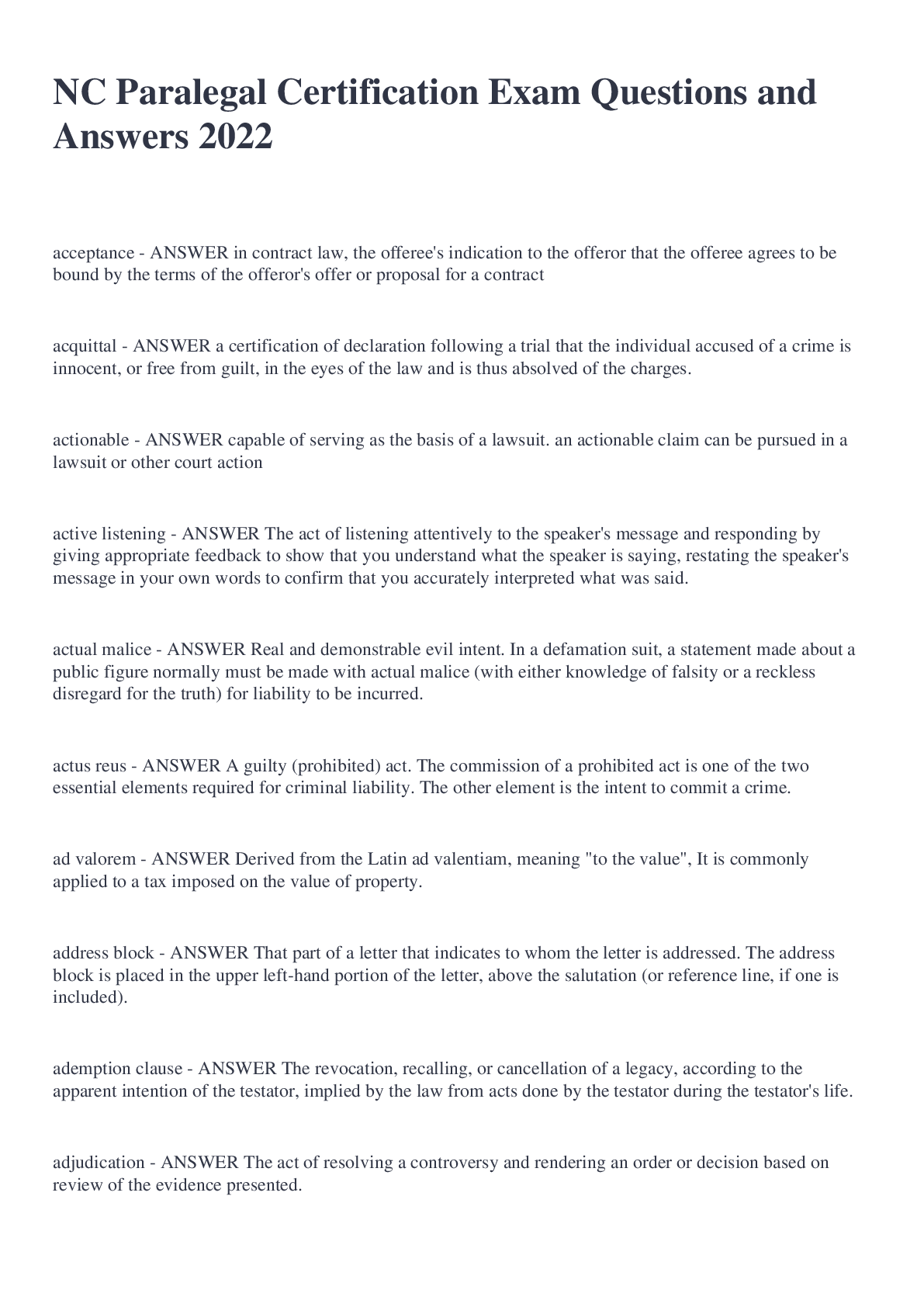
Reviews( 0 )
Document information
Connected school, study & course
About the document
Uploaded On
Sep 05, 2022
Number of pages
57
Written in
Additional information
This document has been written for:
Uploaded
Sep 05, 2022
Downloads
0
Views
35


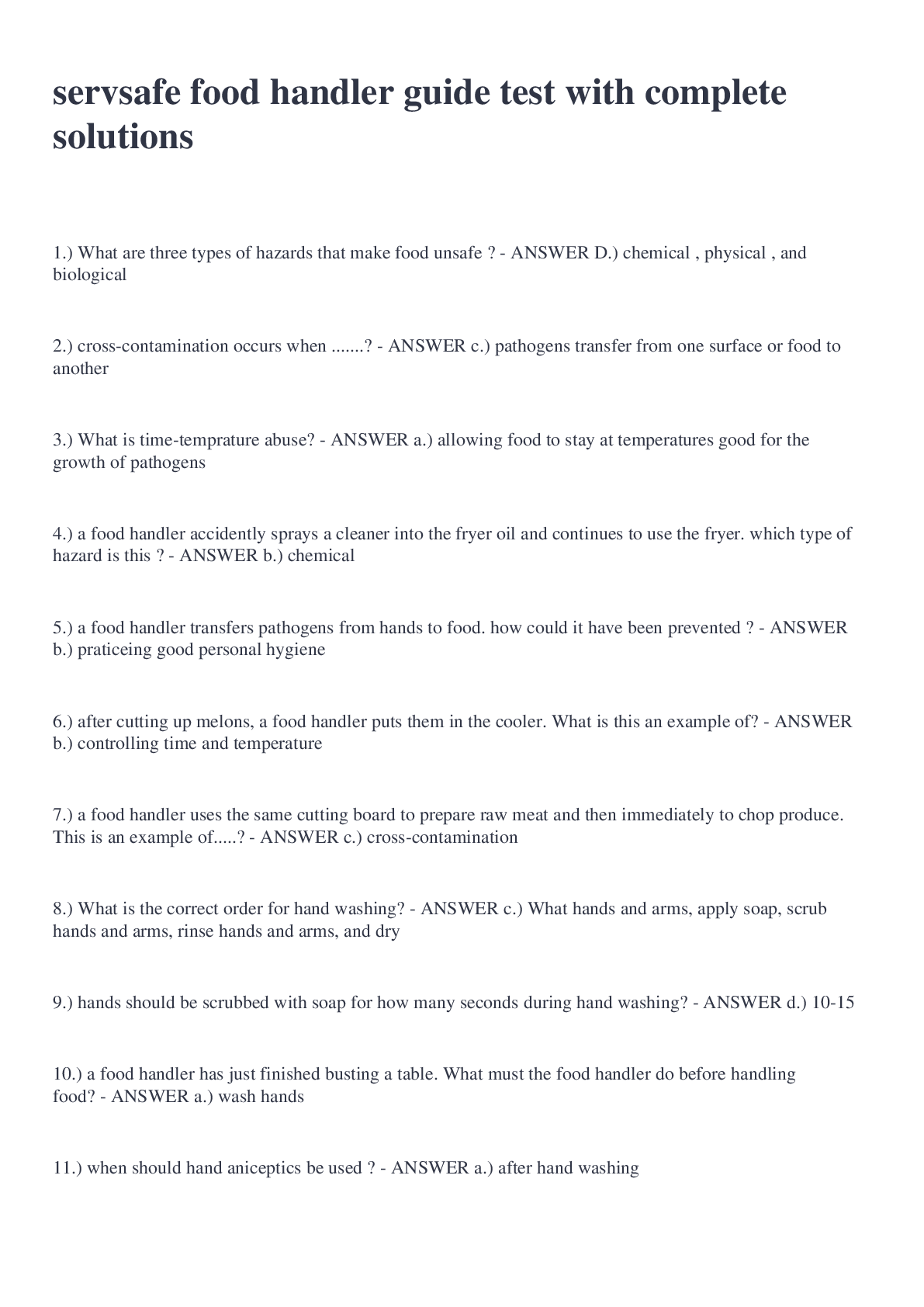
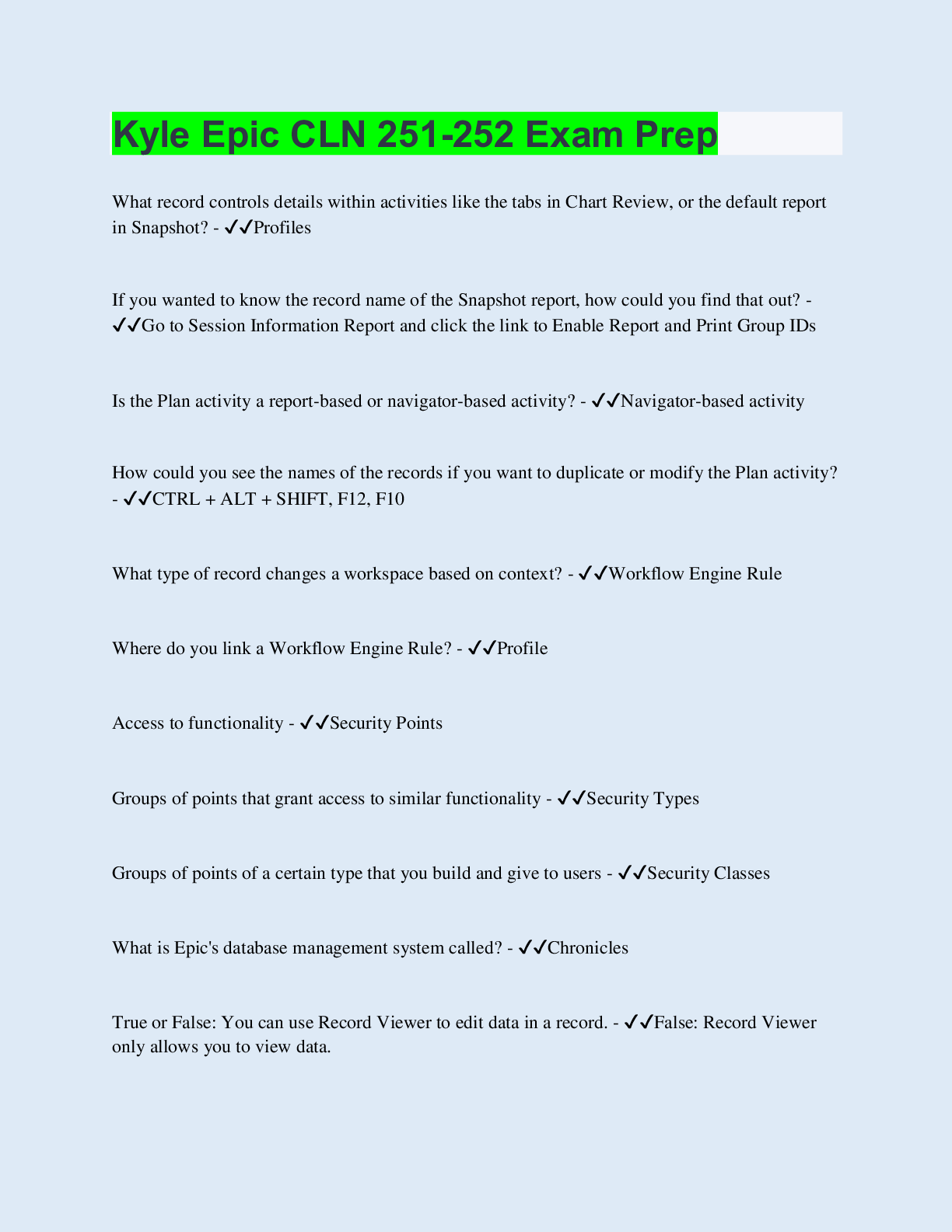
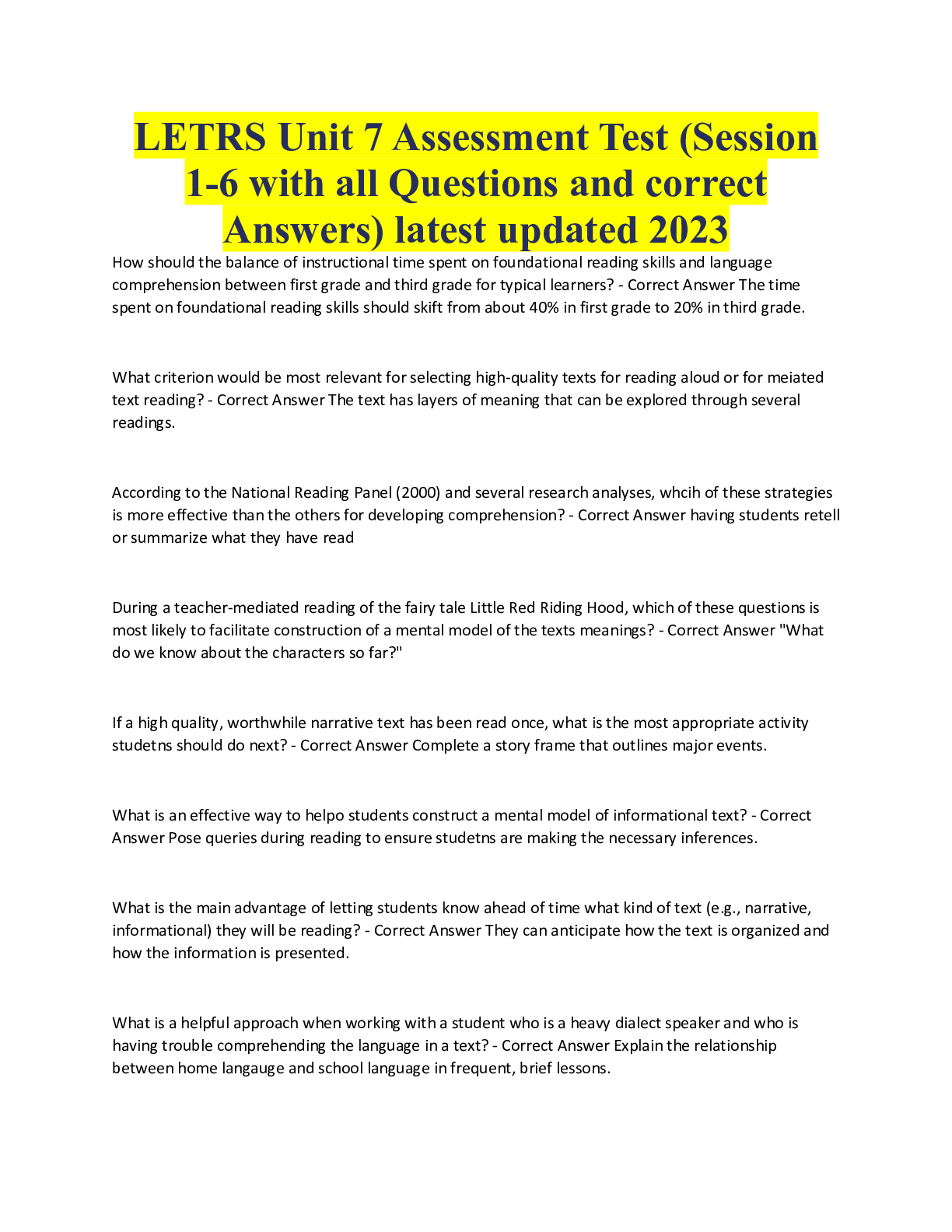
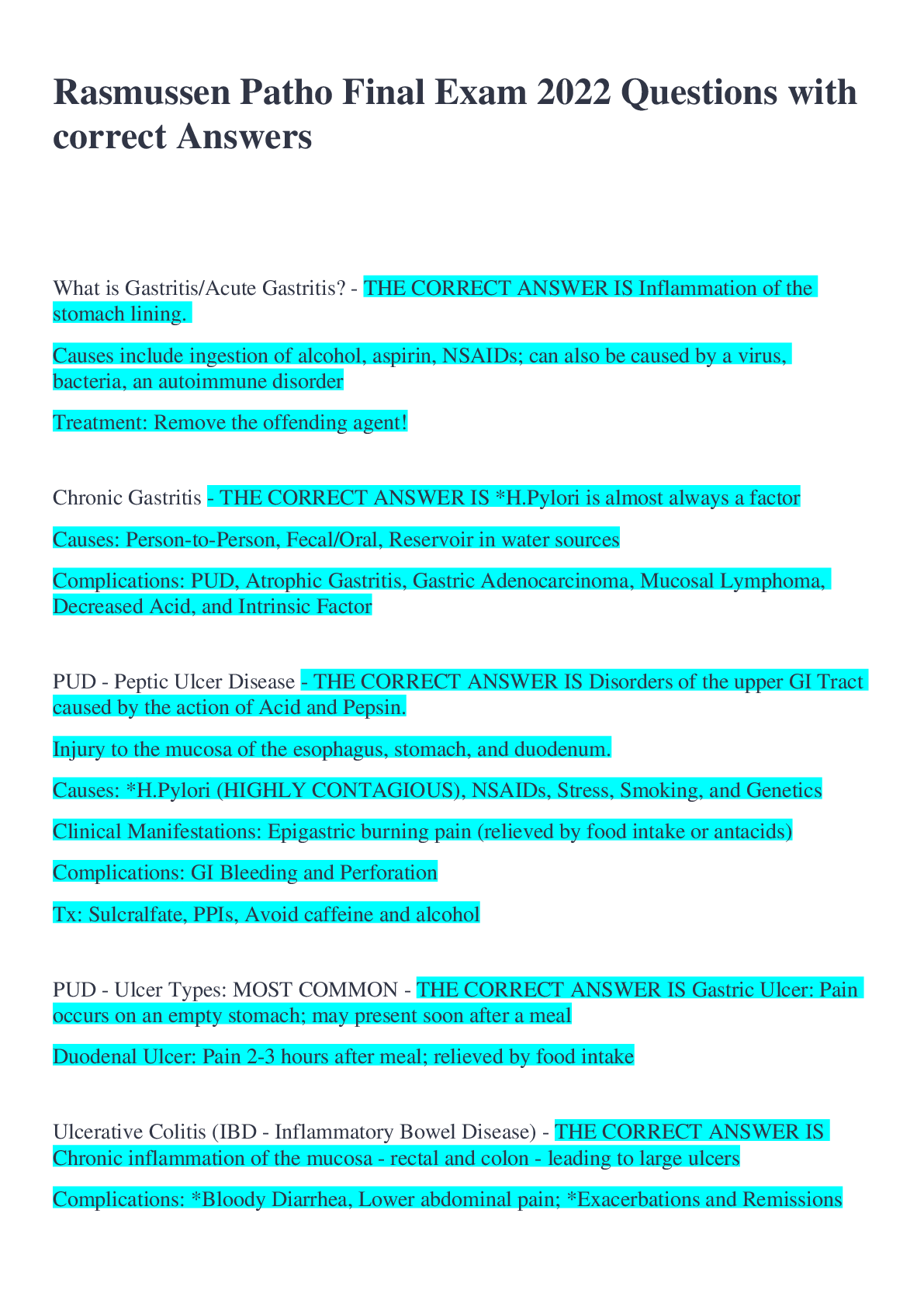
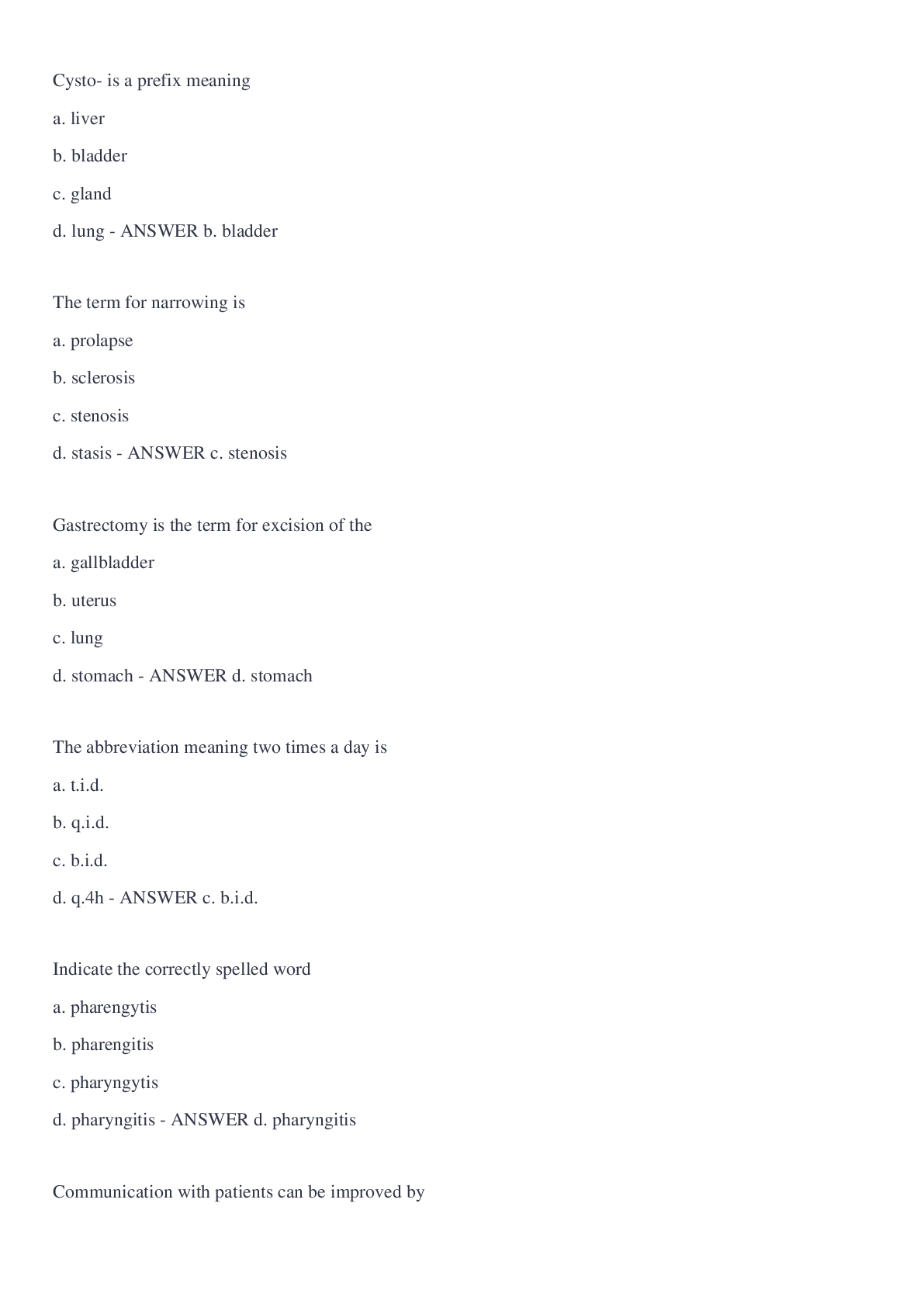
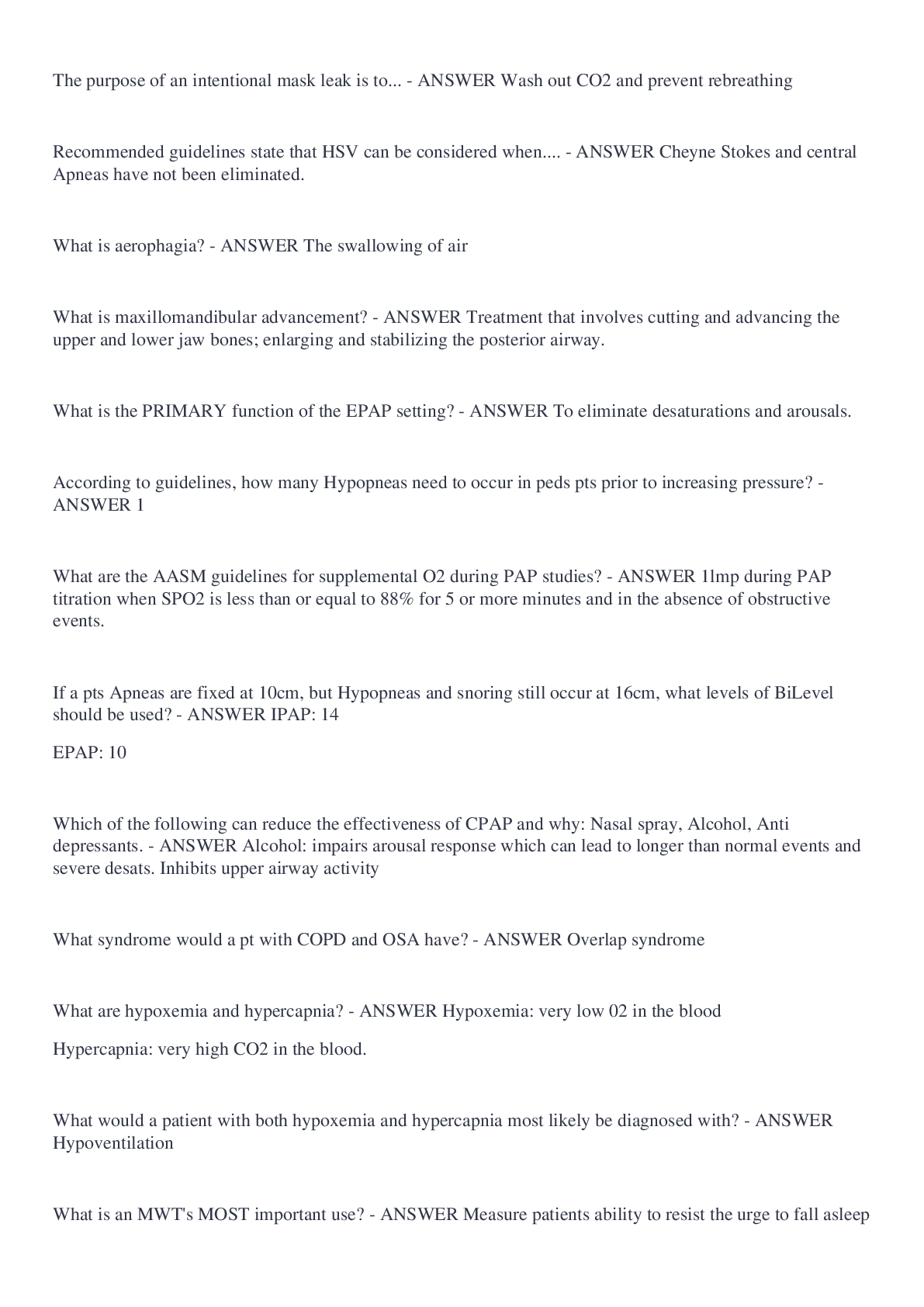
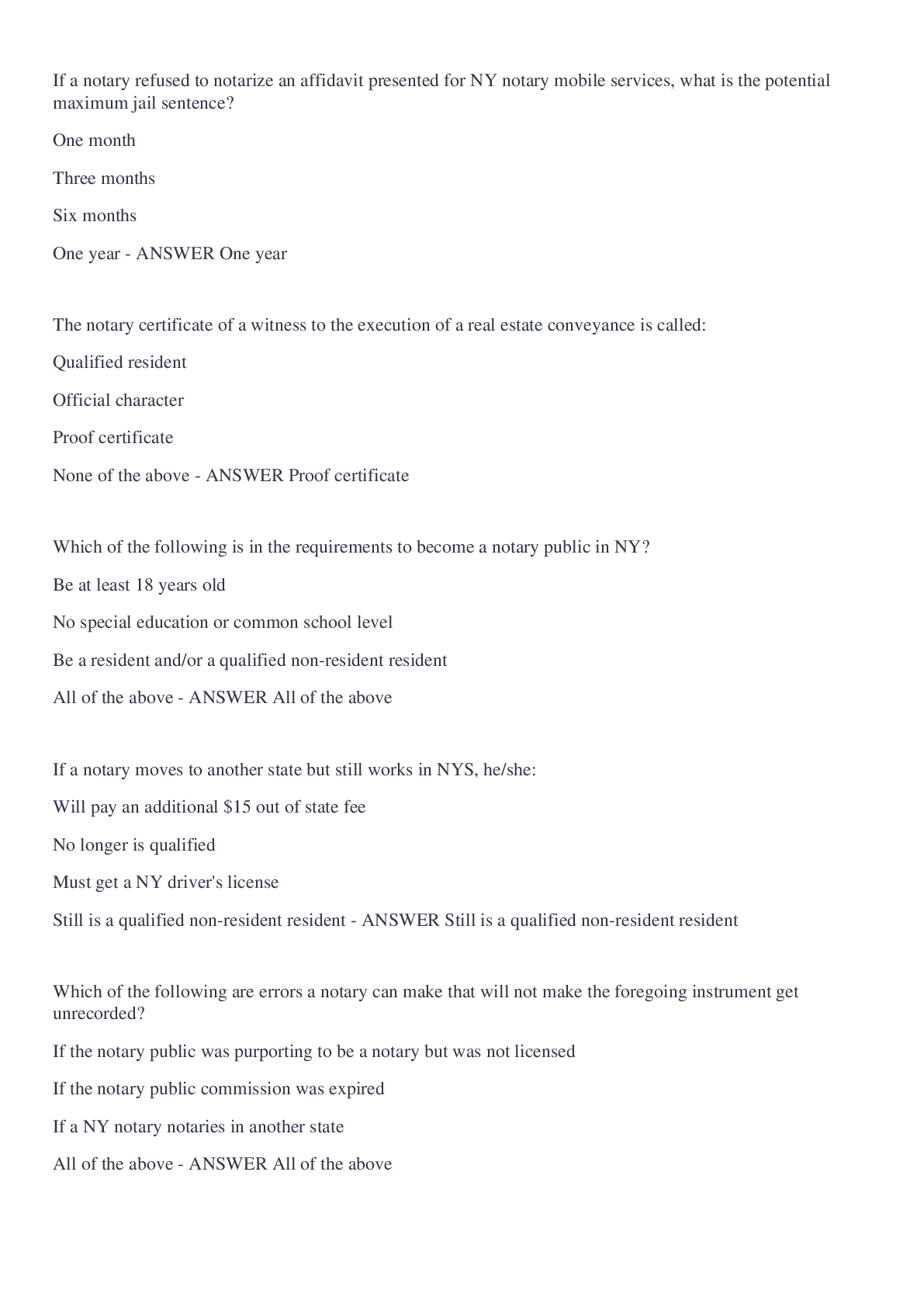

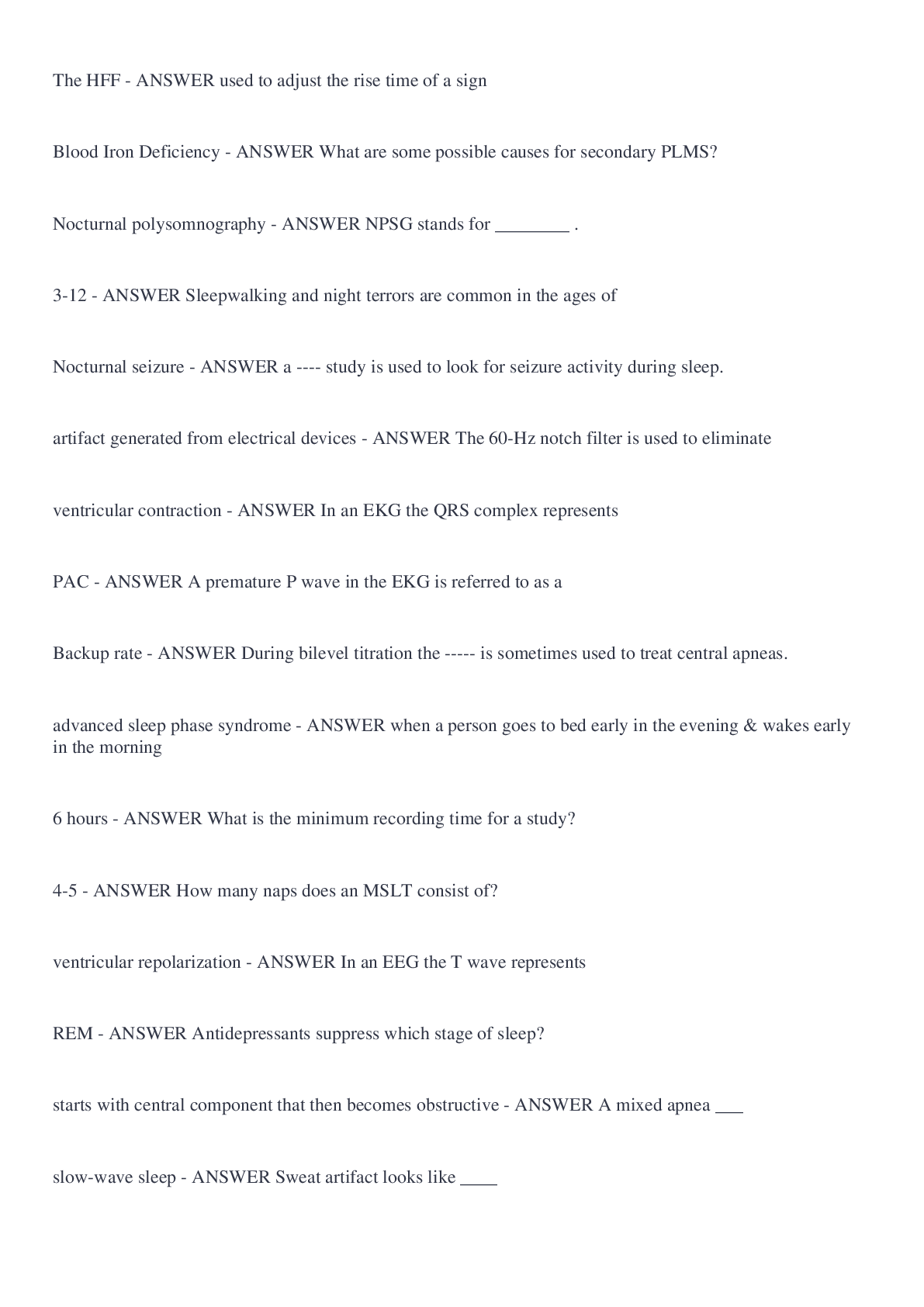
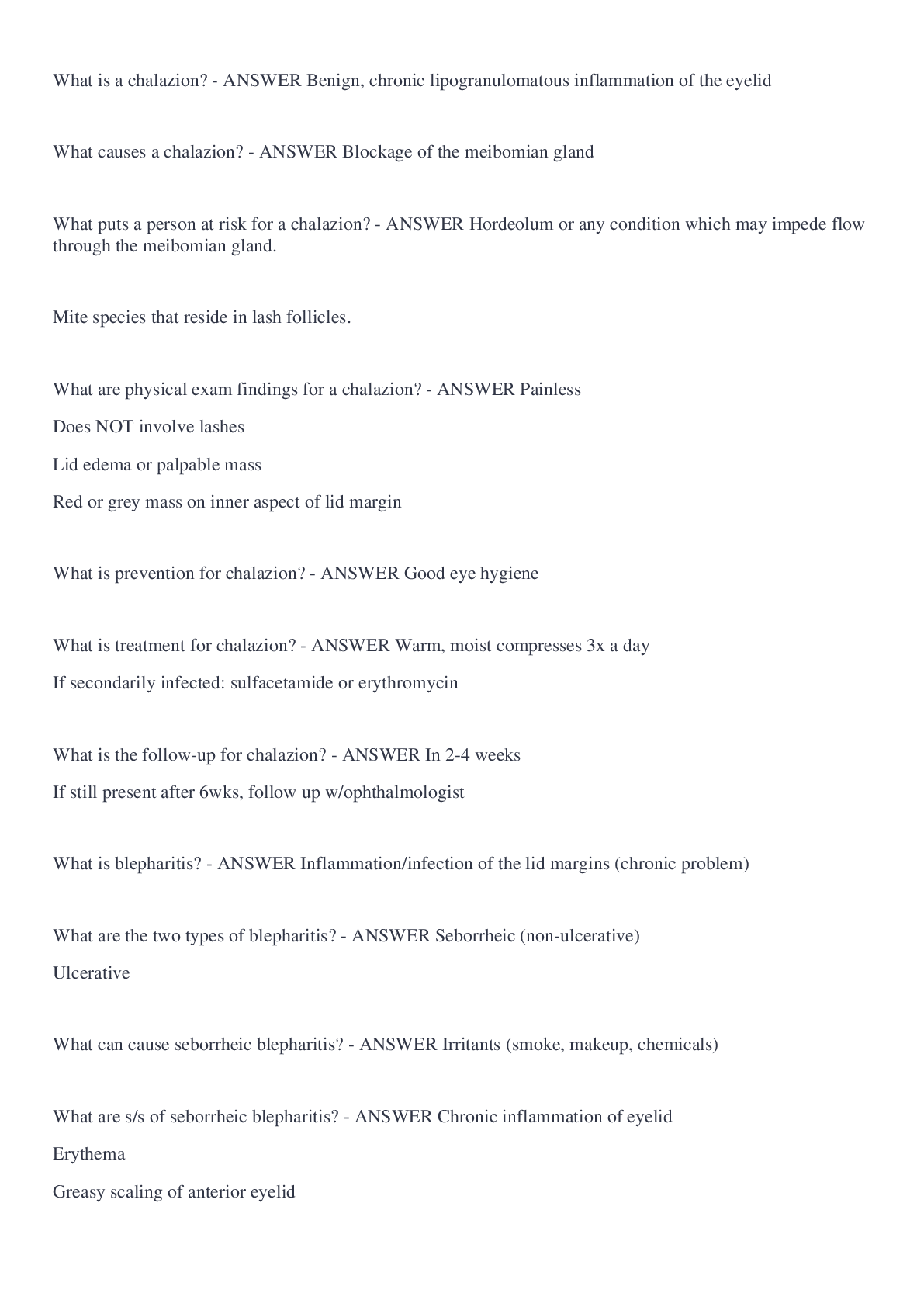
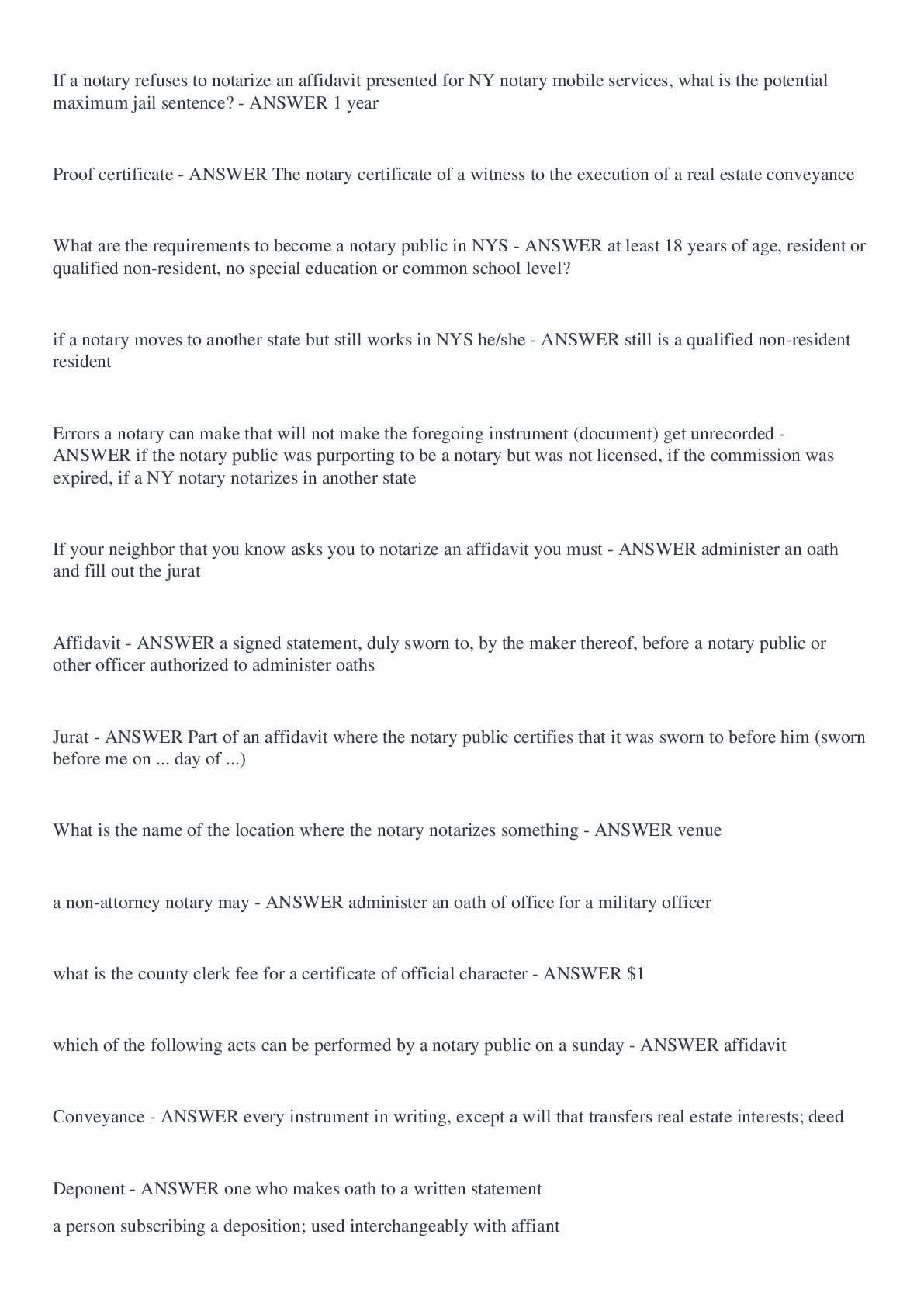
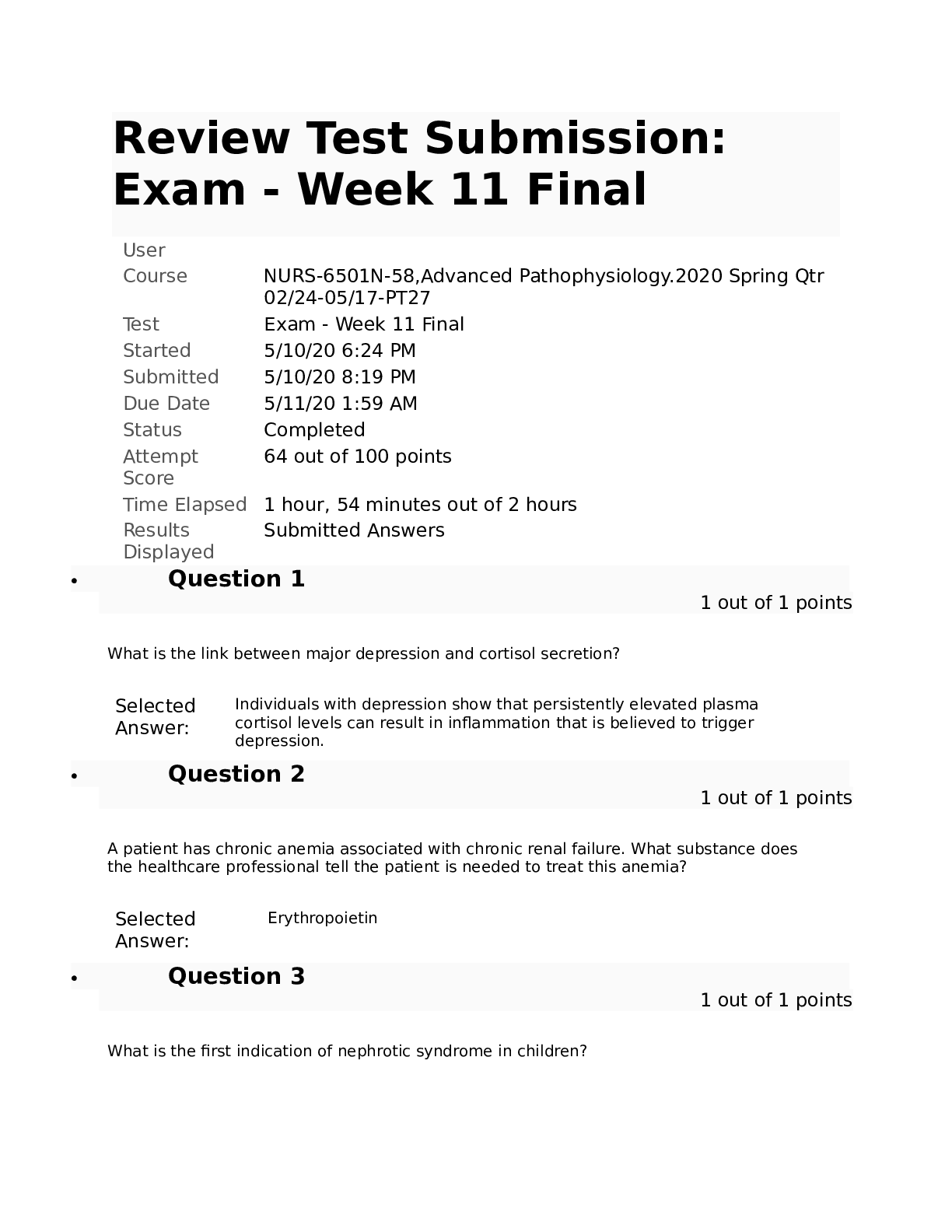
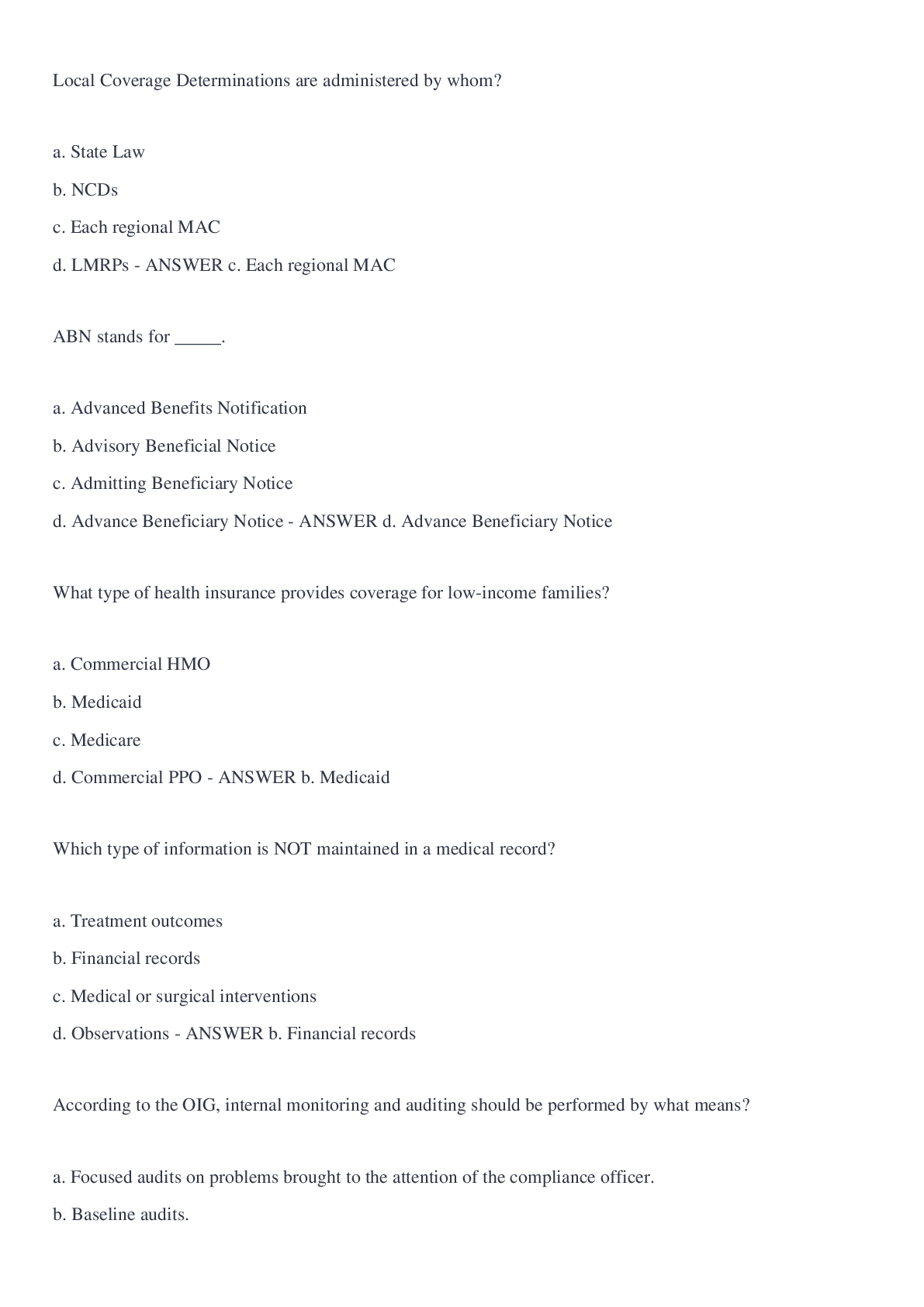
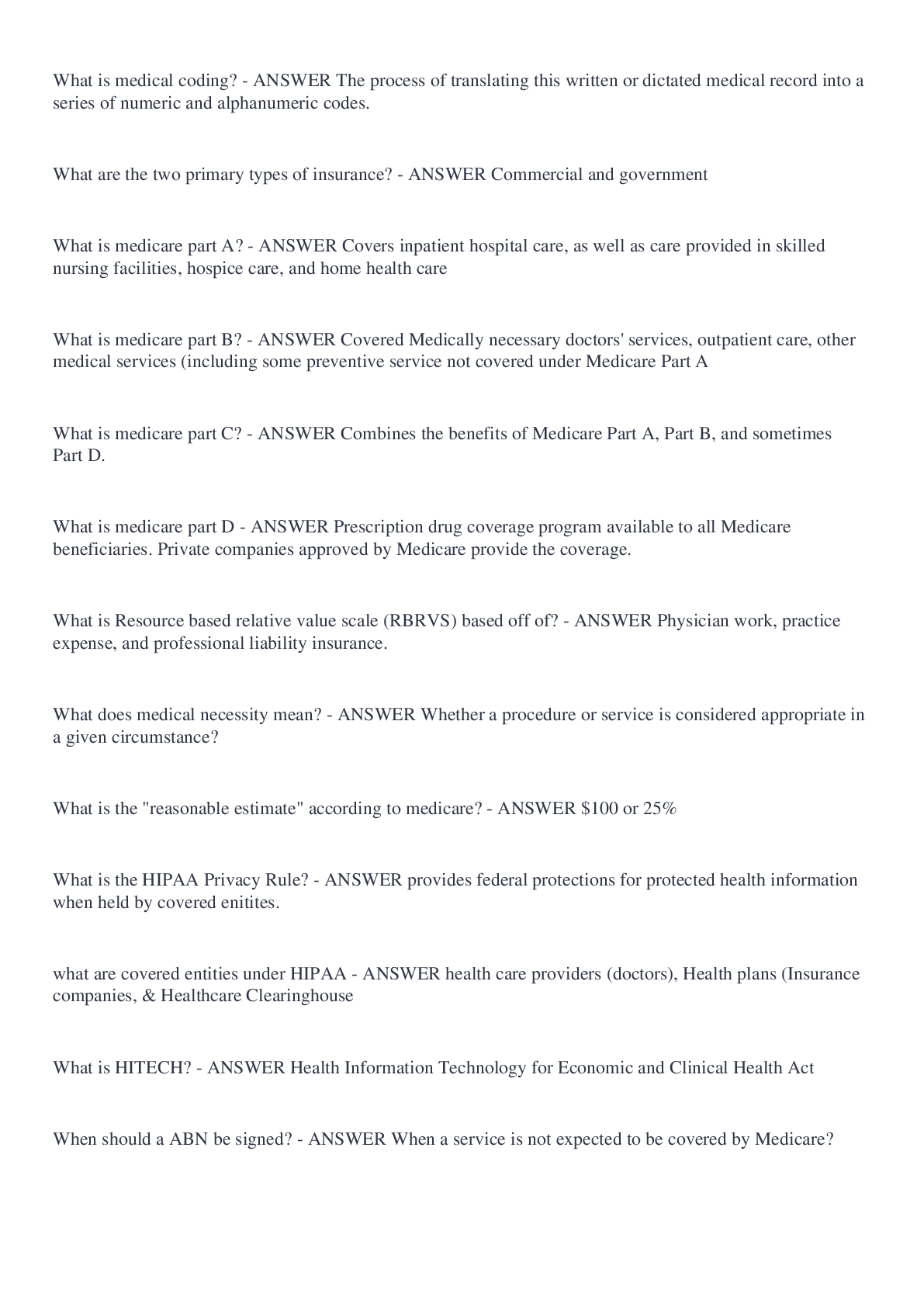
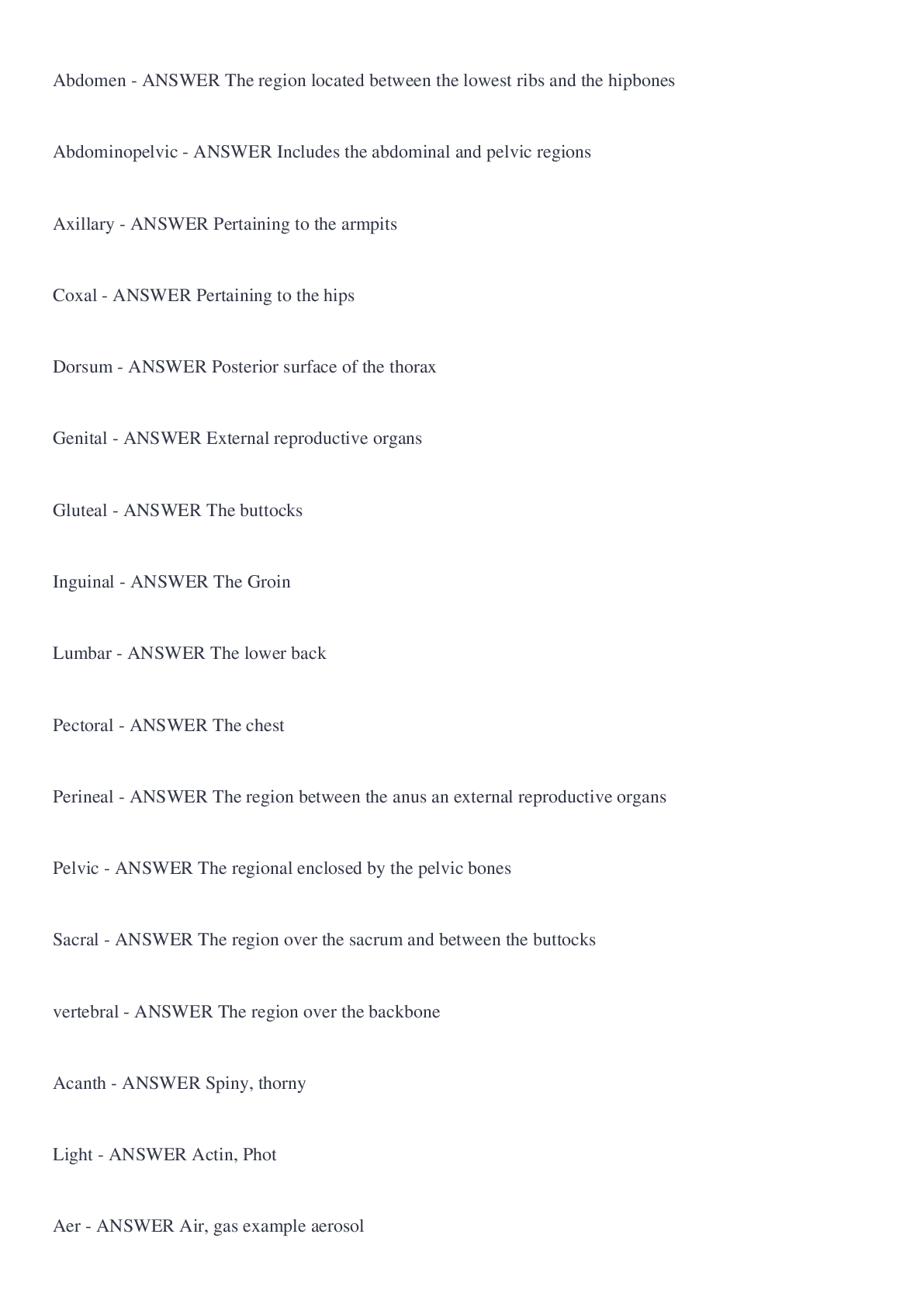
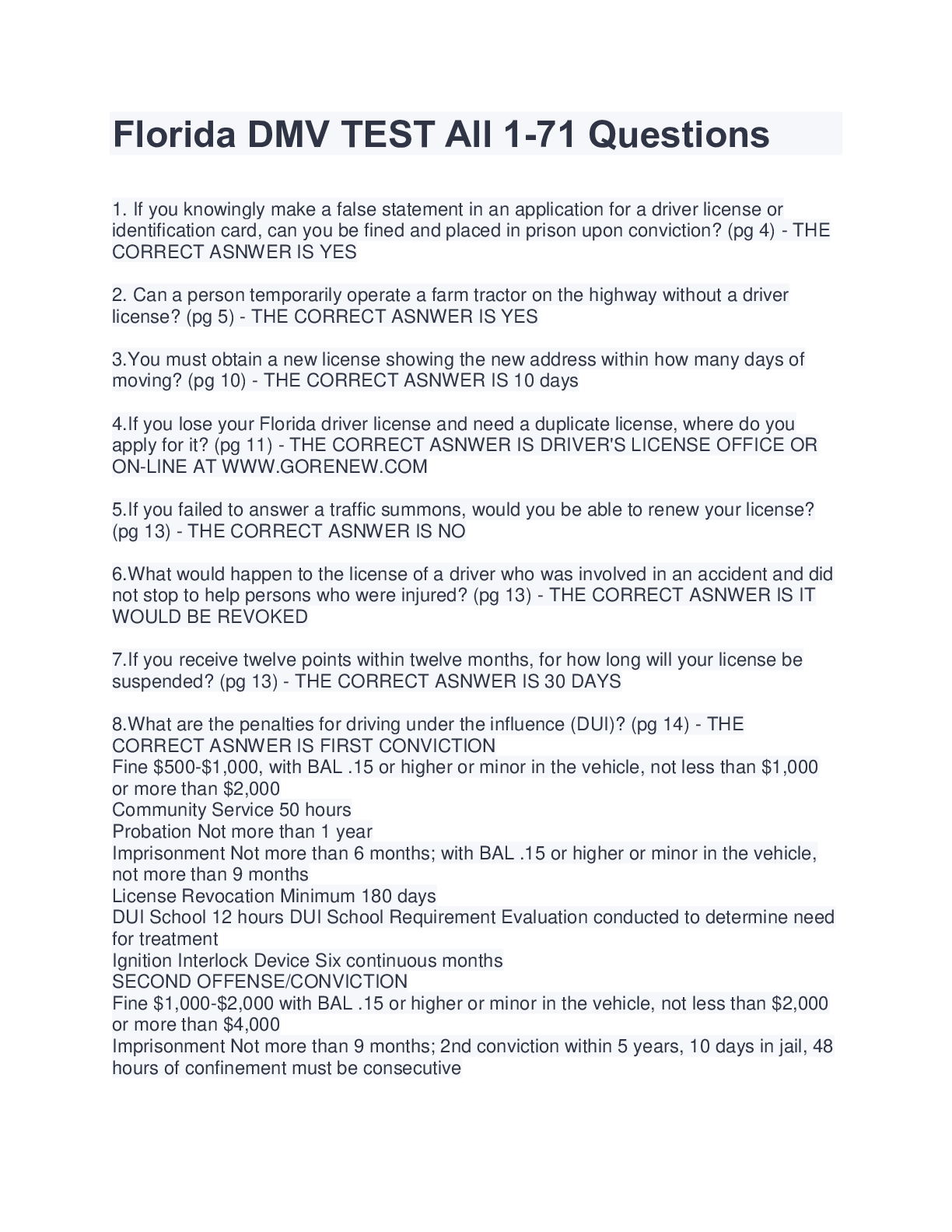
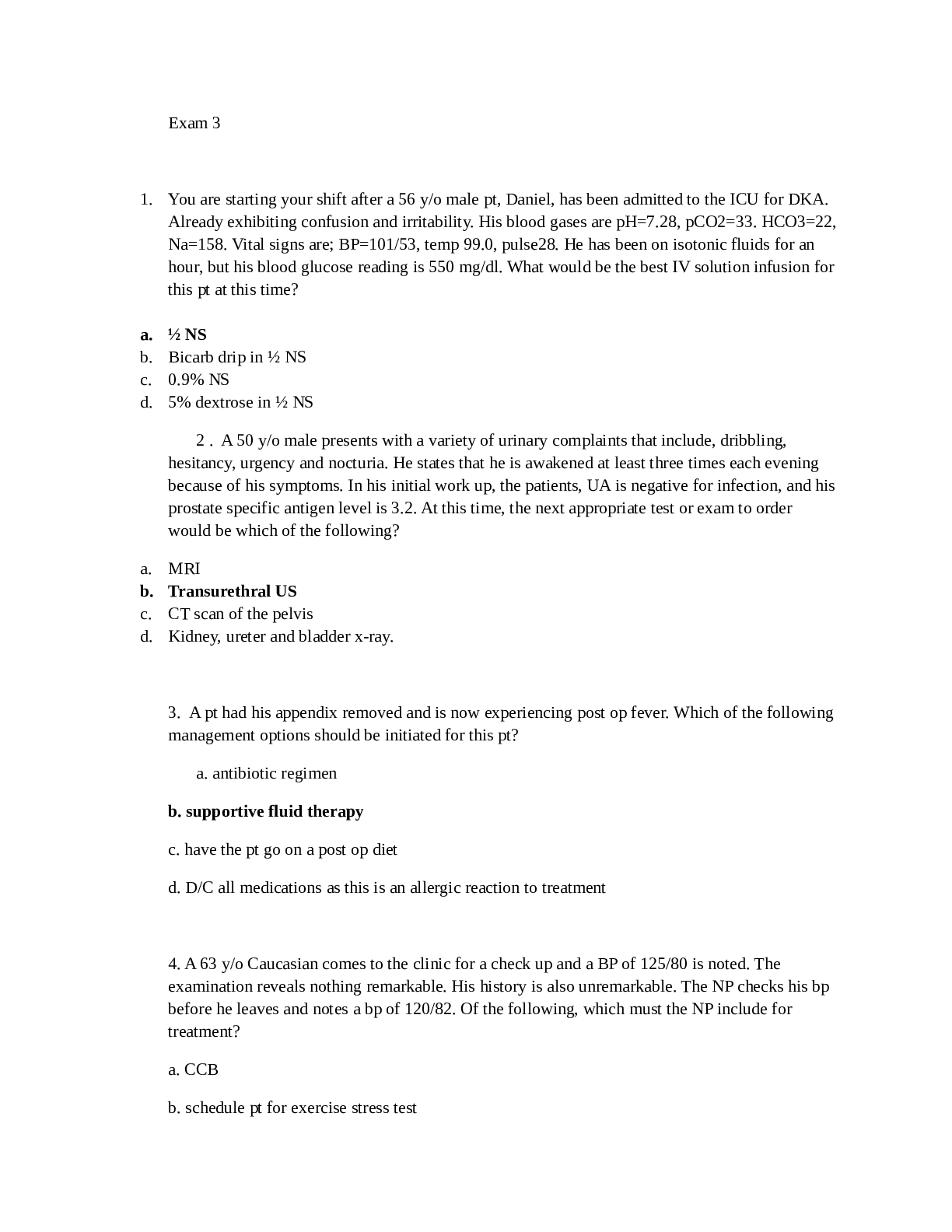
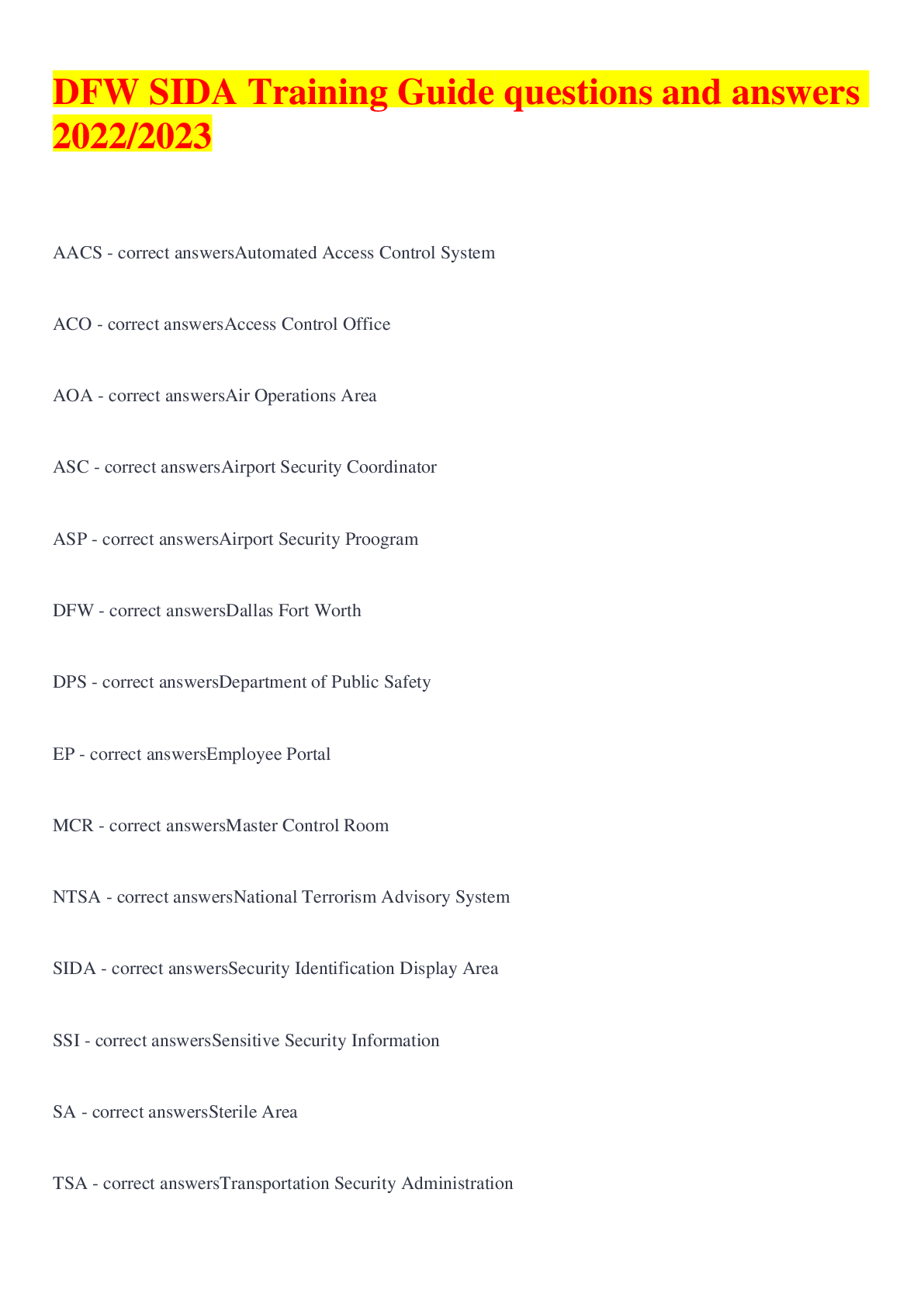
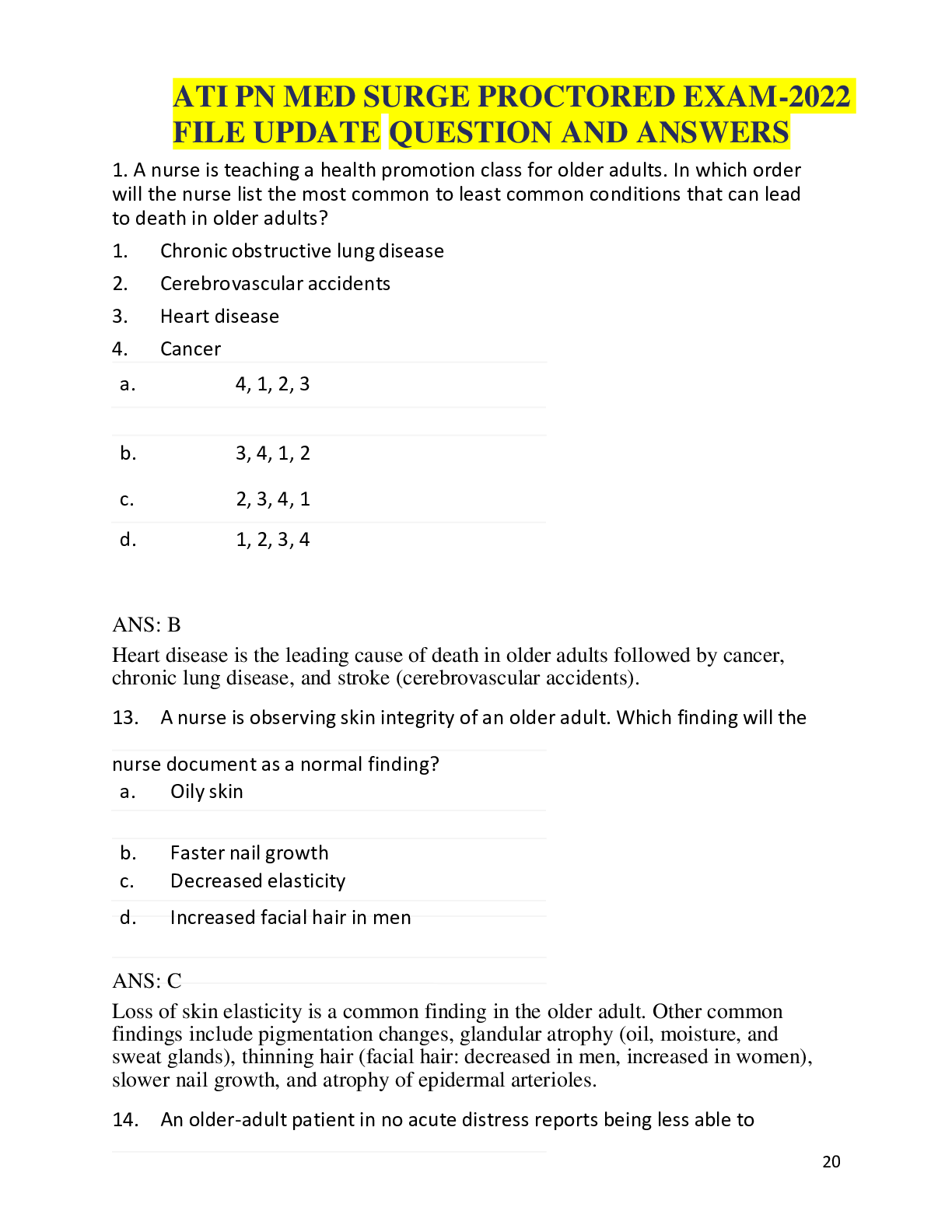
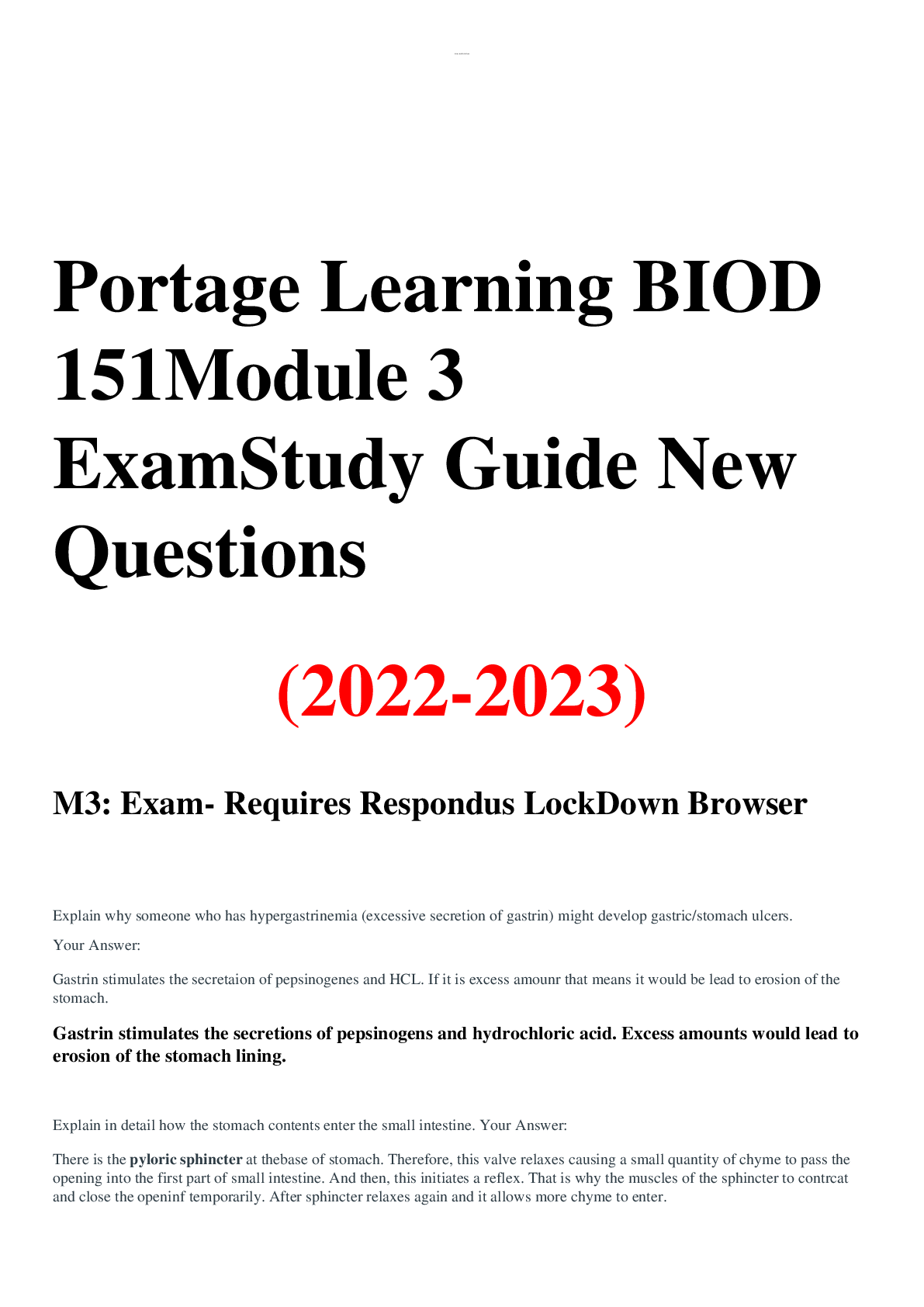
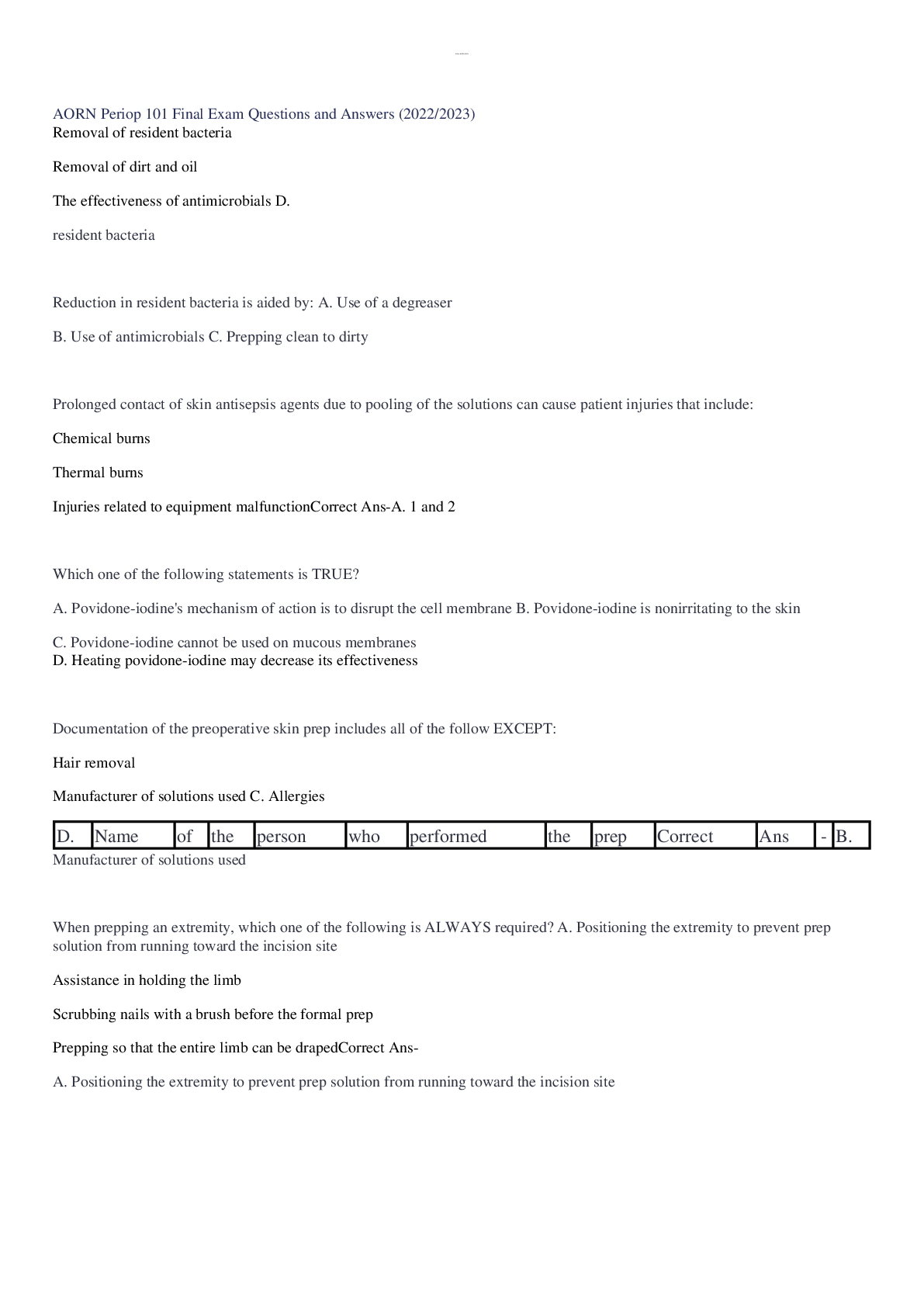
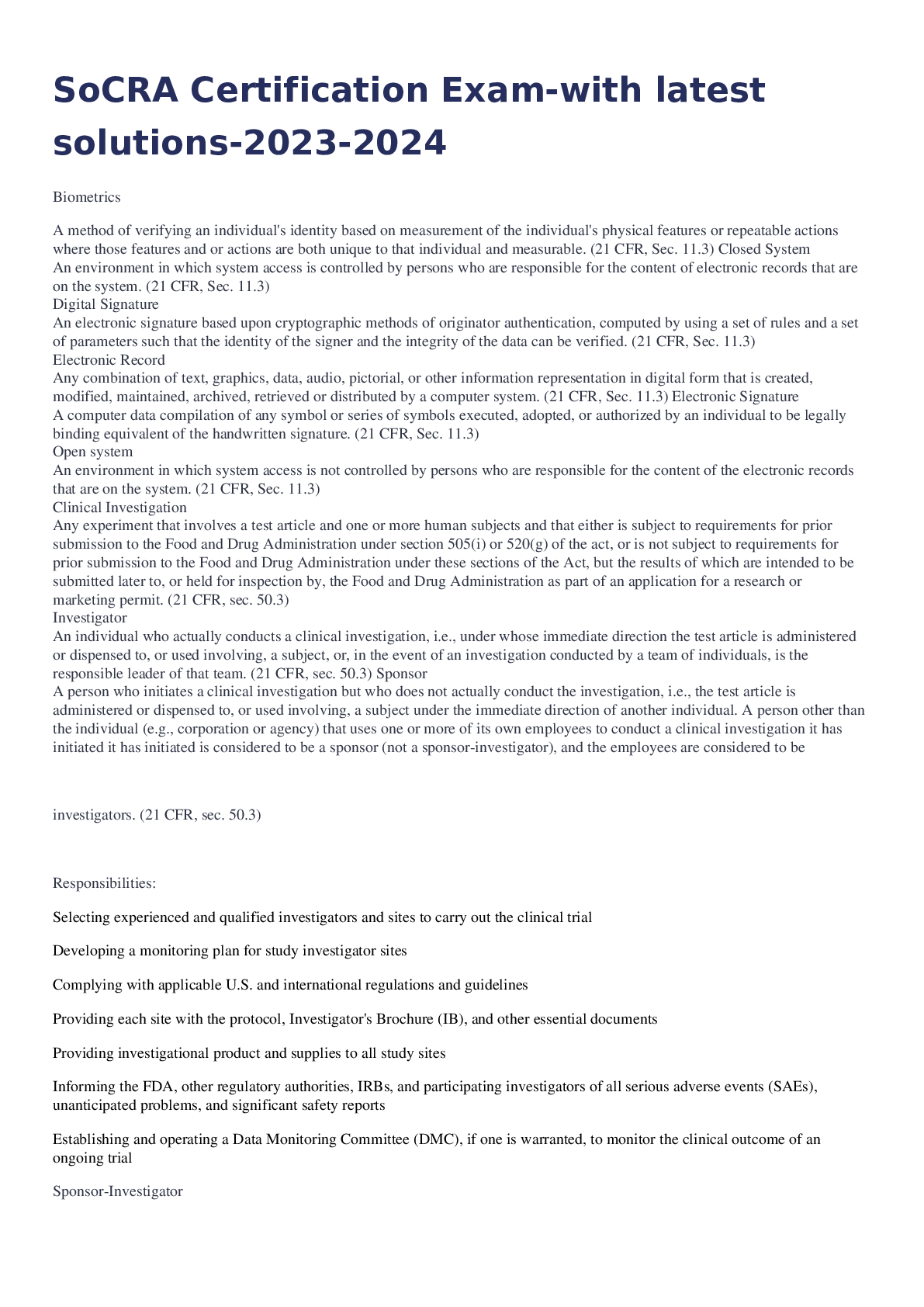
.png)

